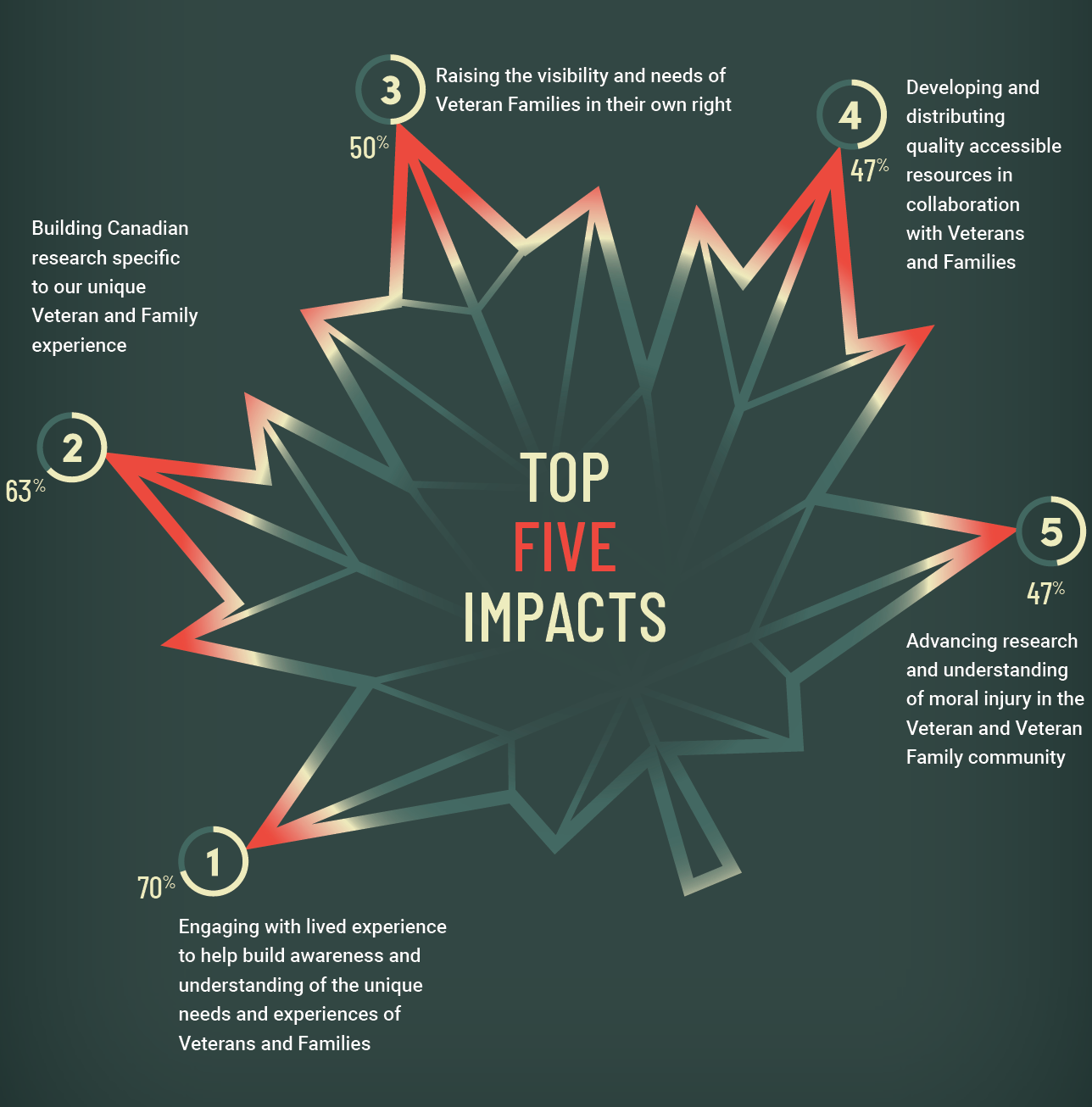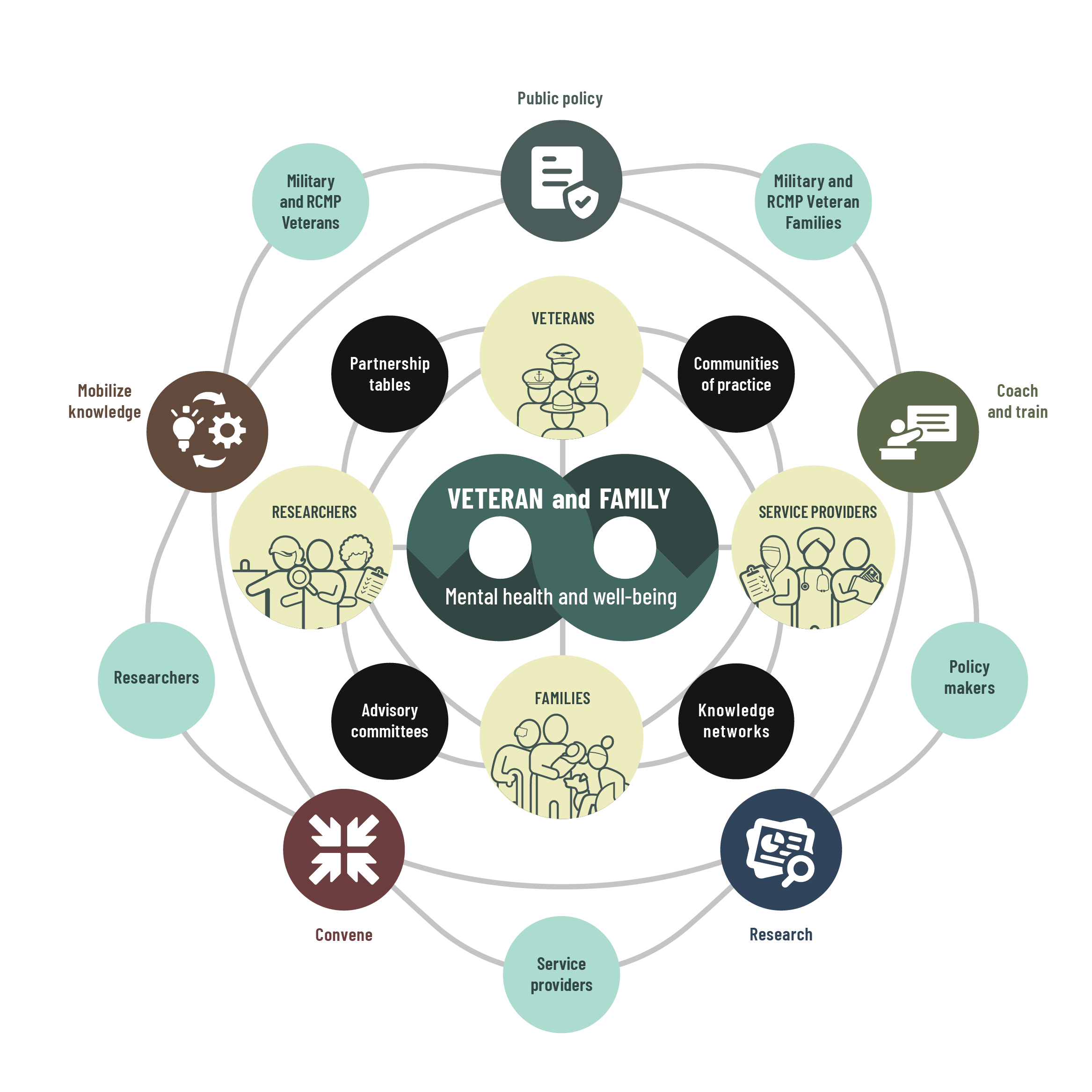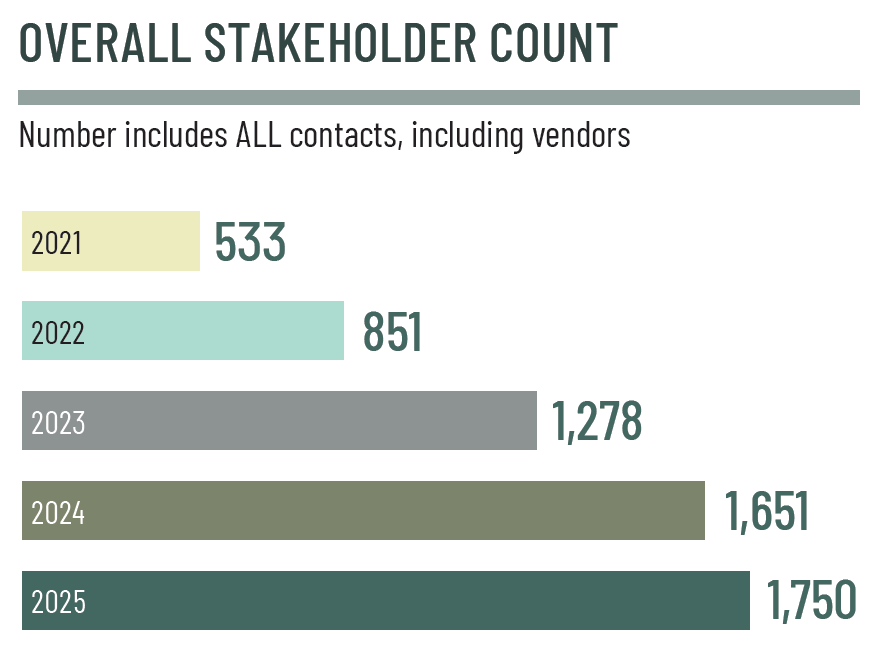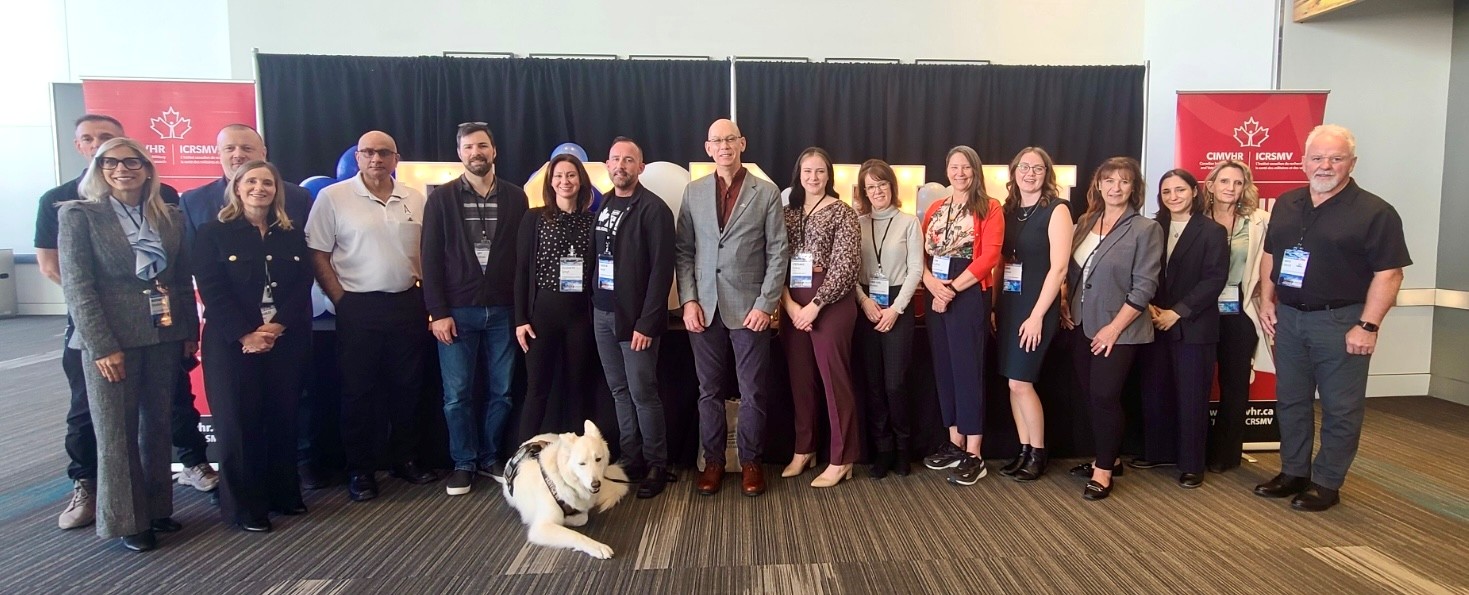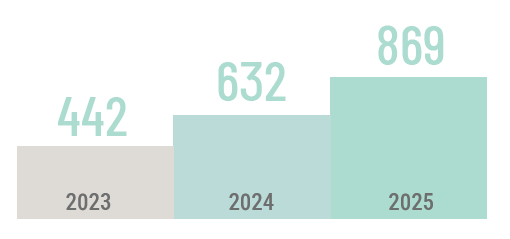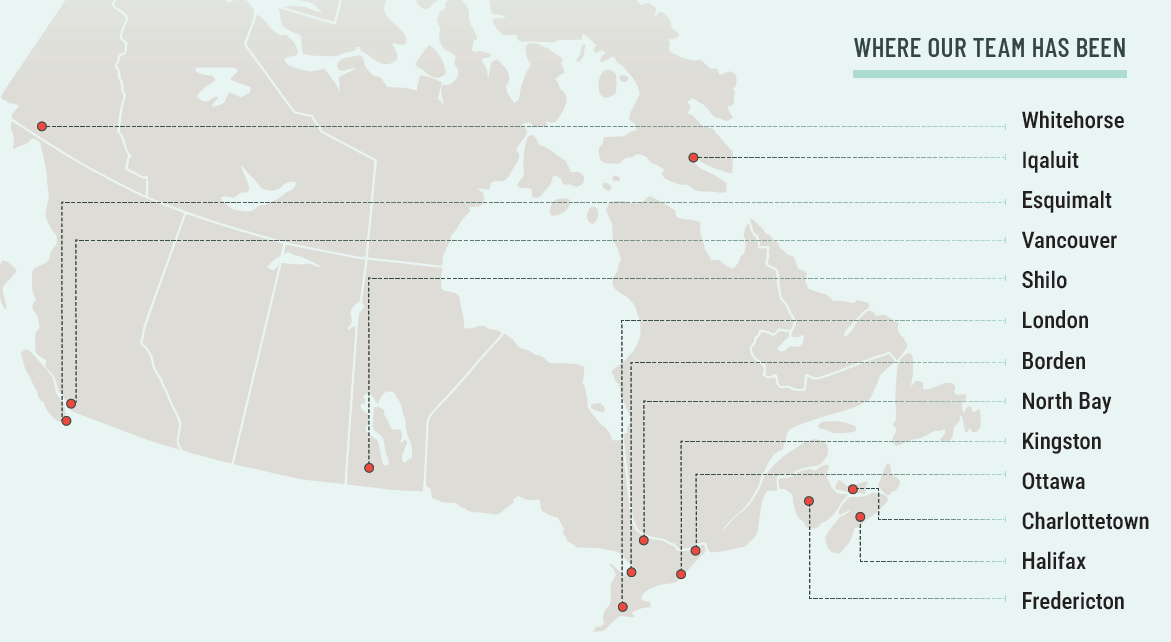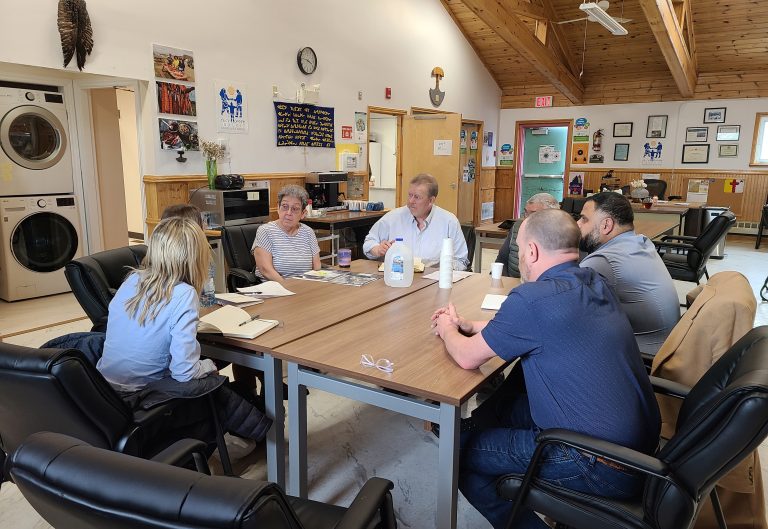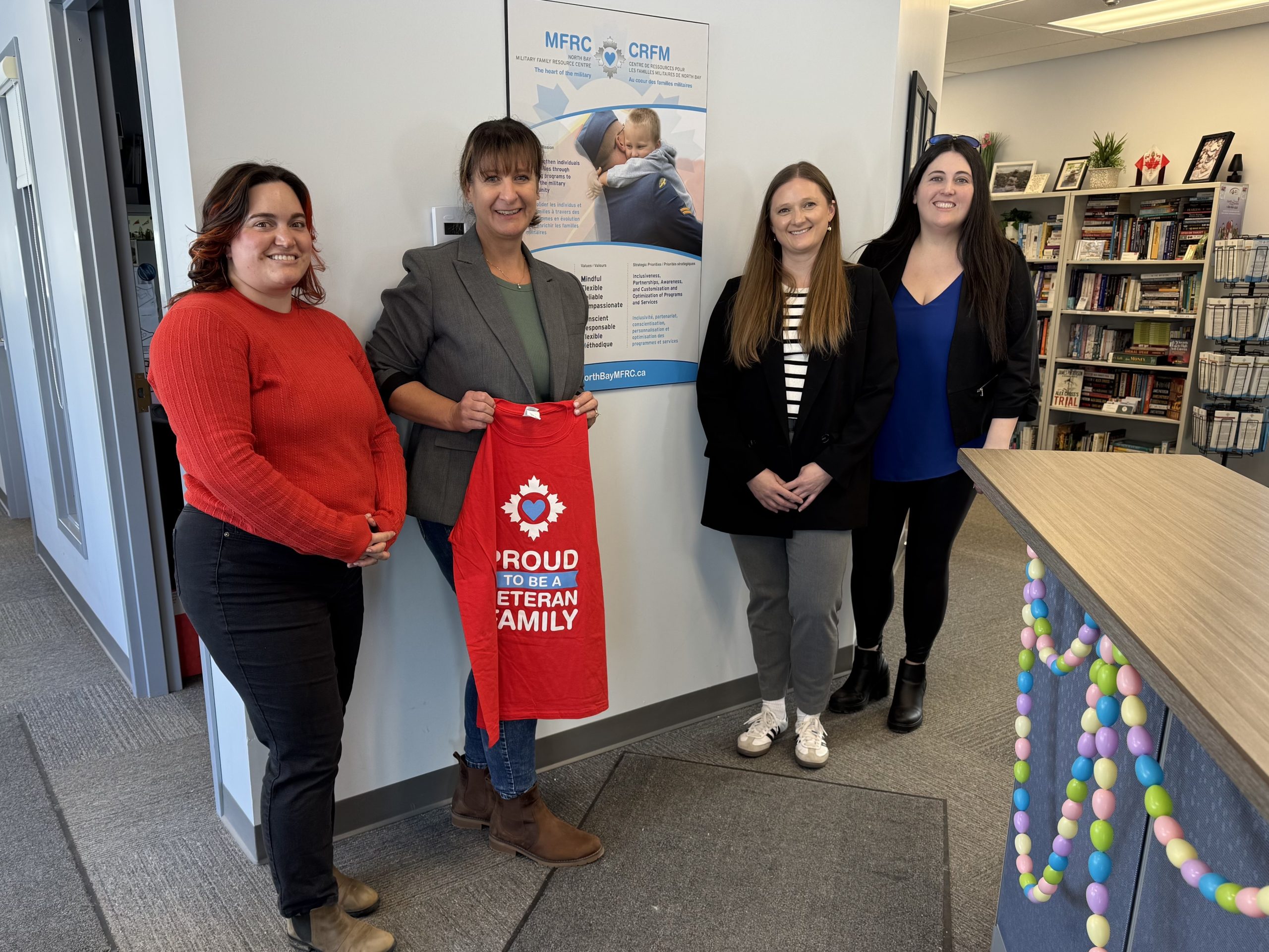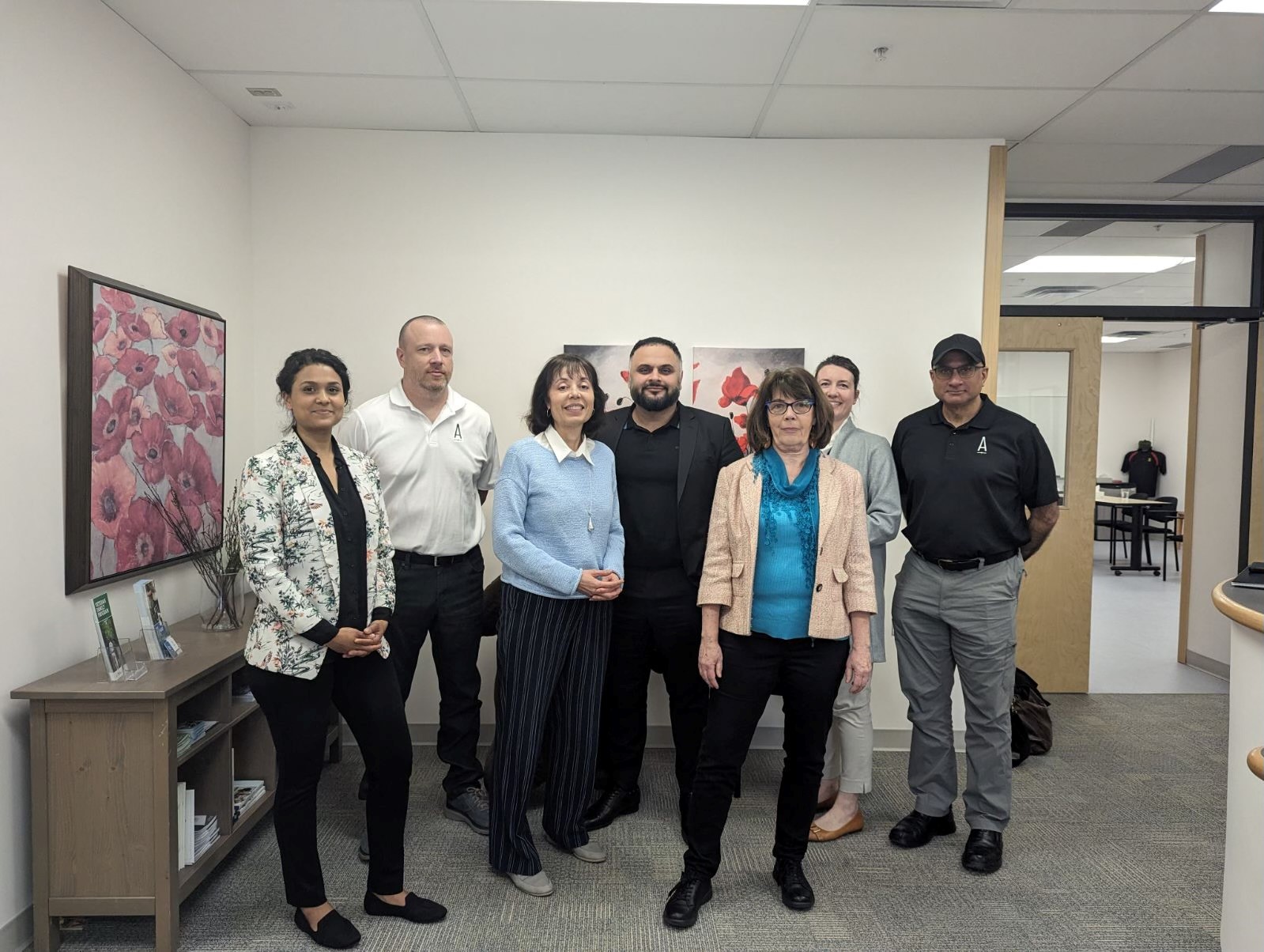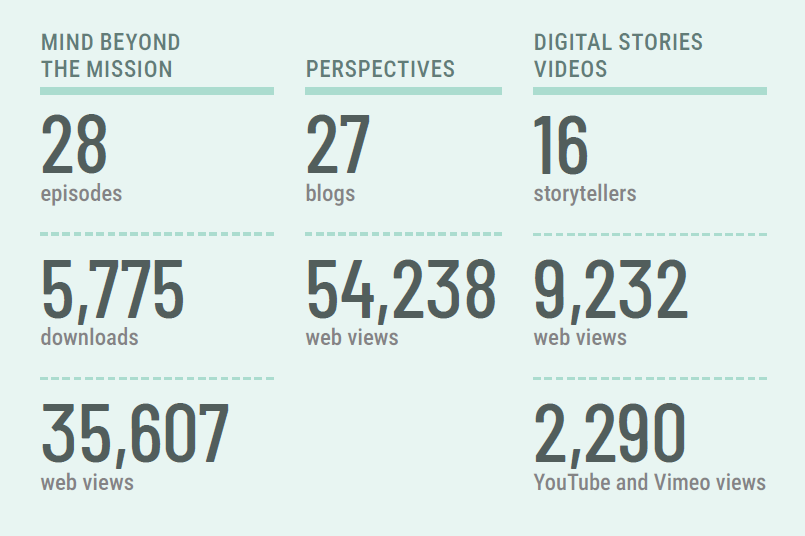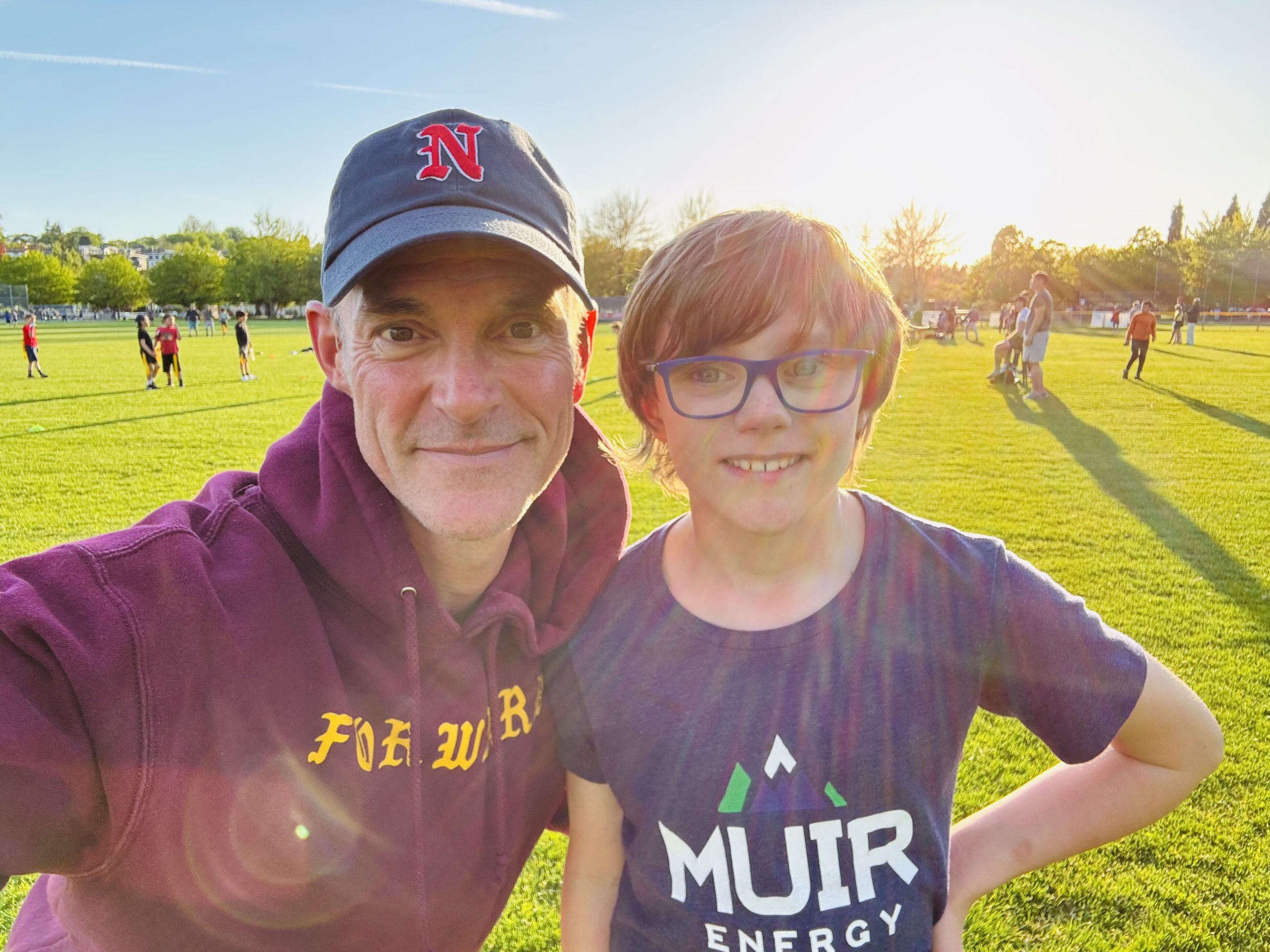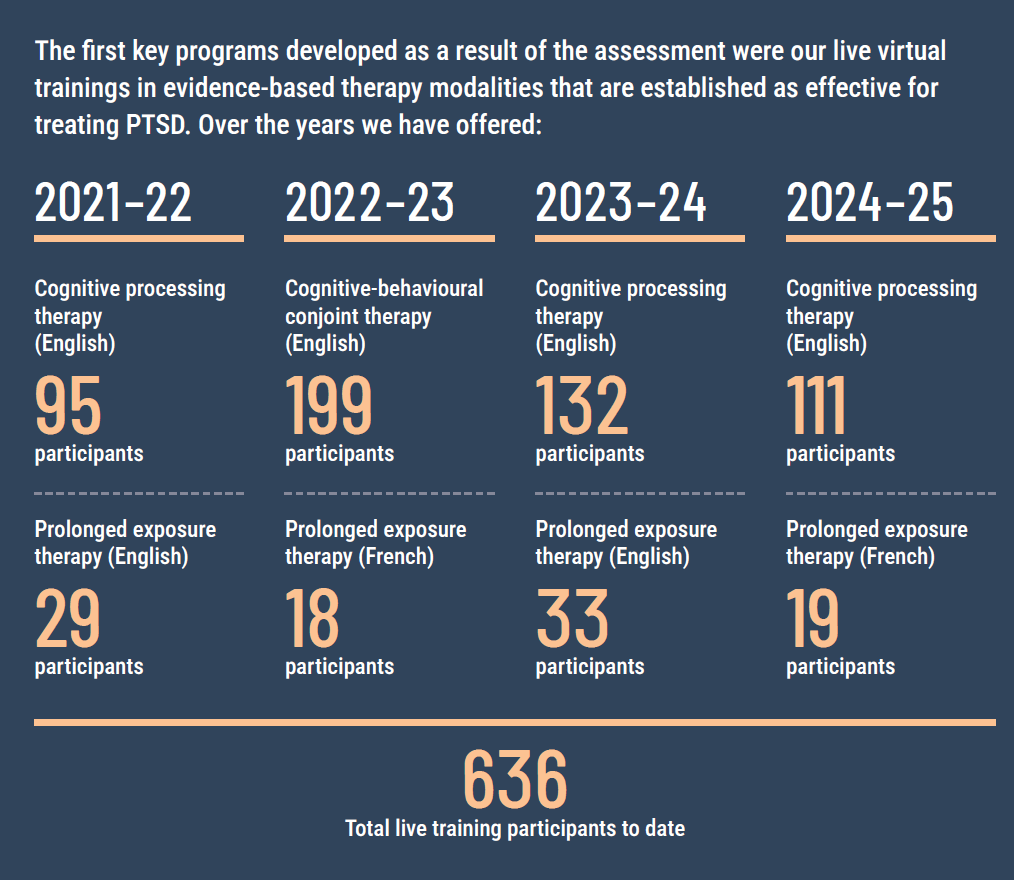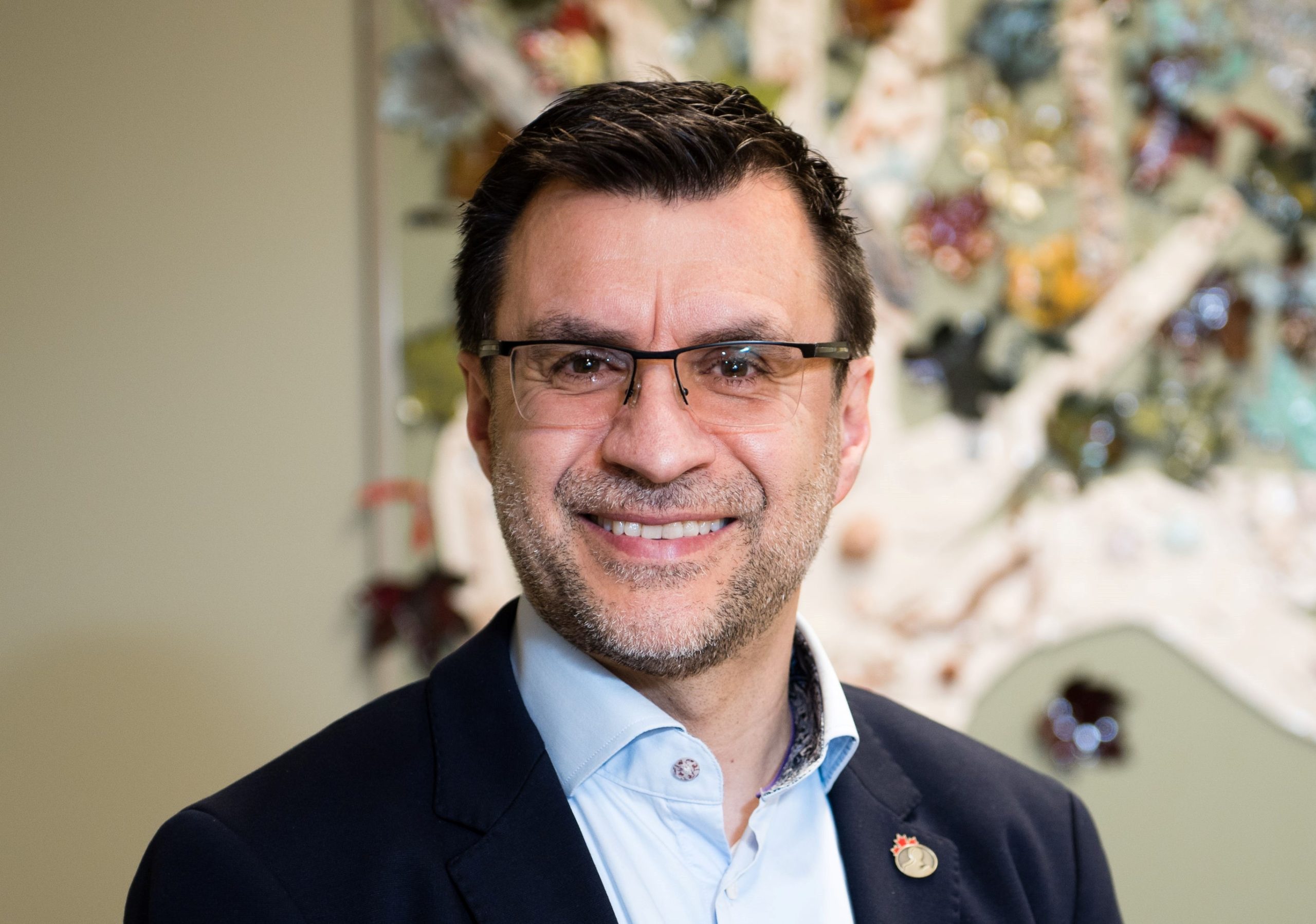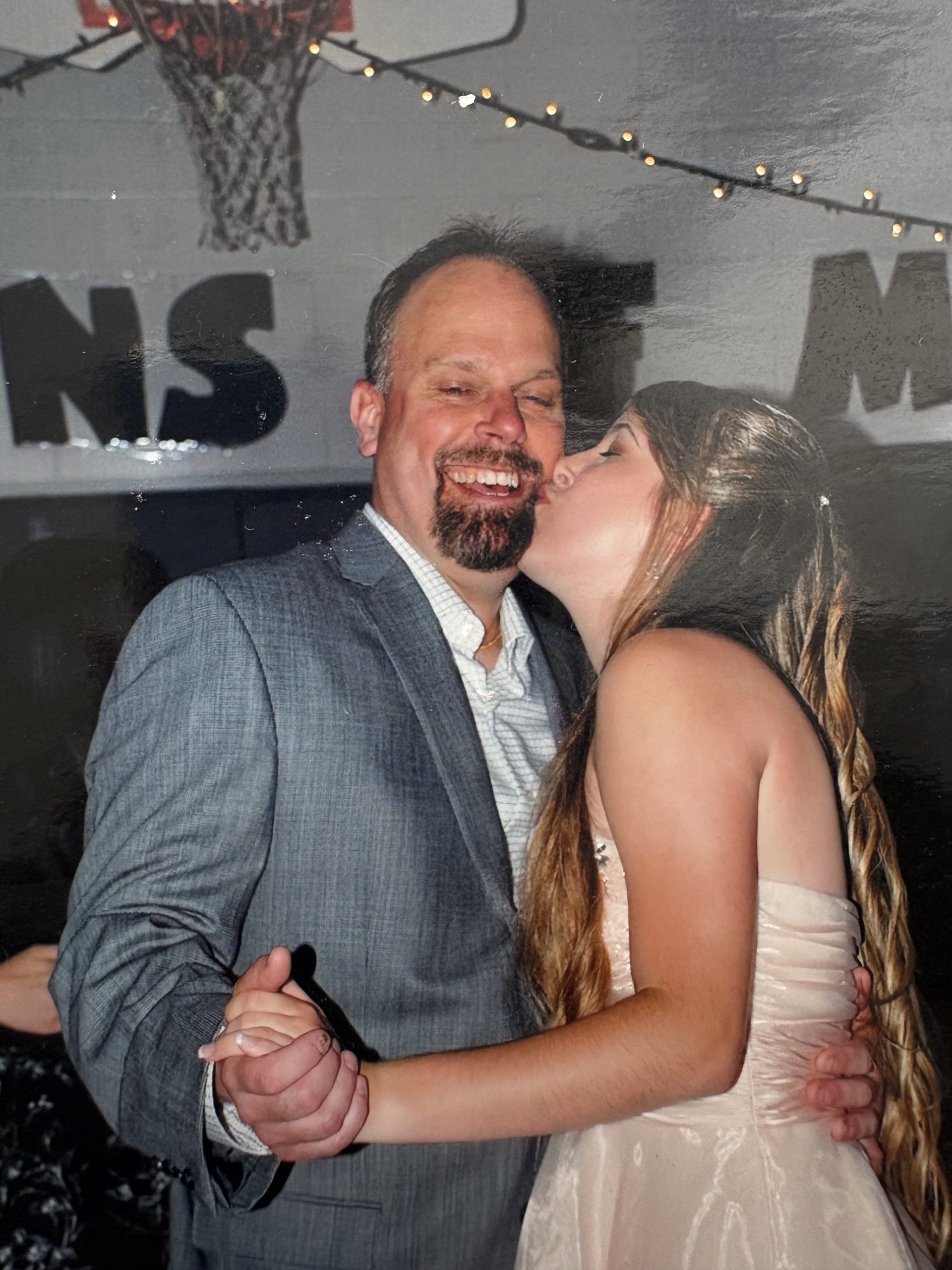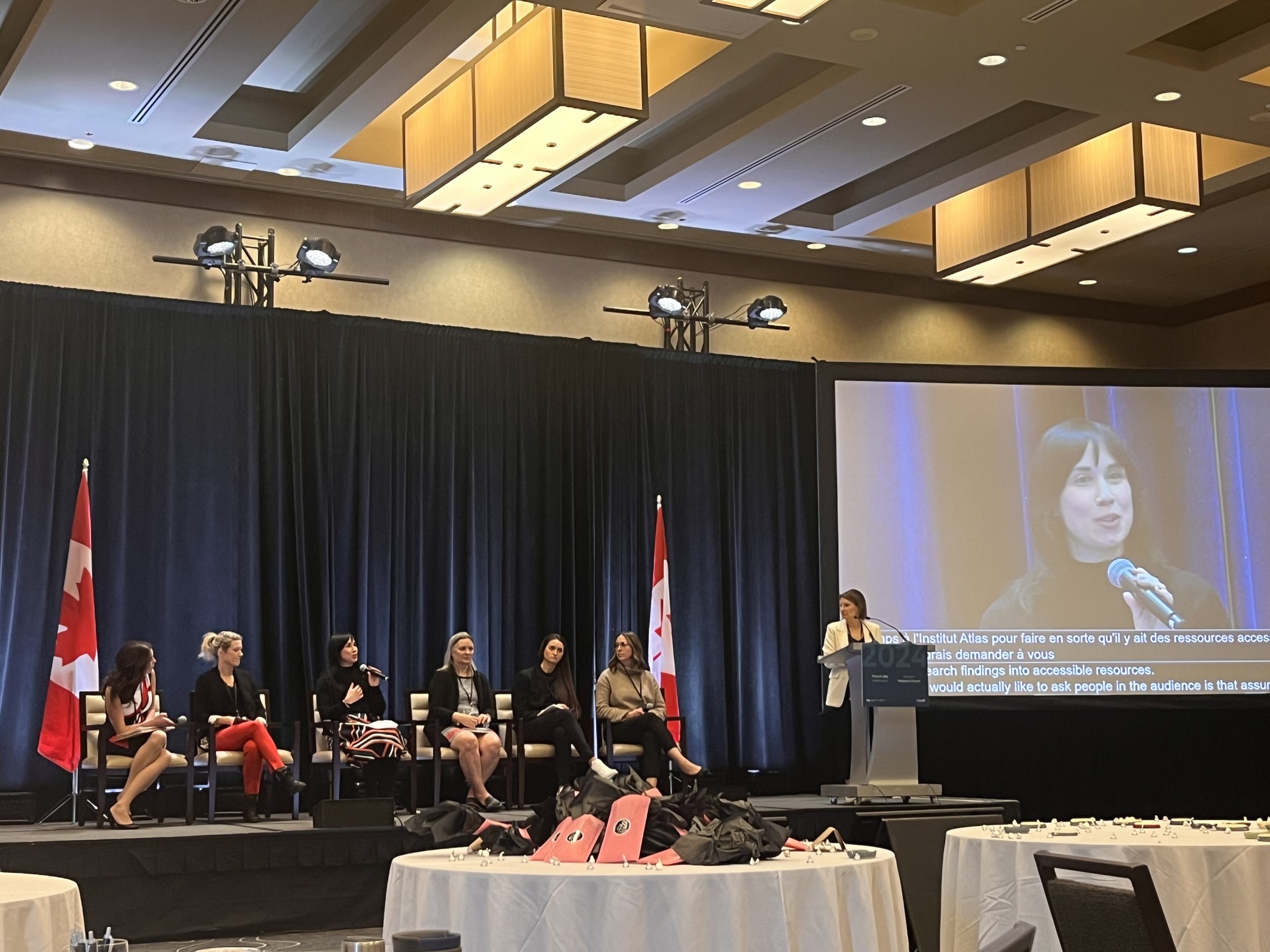Impact report 2019-24
Celebrating 5 years of strength, stability and growth
As we take a look at what five years has meant since the Atlas Institute for Veterans and Families began operating we chose the maple tree — Canada’s national tree — as a visual representation of our short but strong history. Trees are symbols of strength and wisdom, and as we close our fifth year, we believe we have cultivated many of their enduring traits. Just as trees grow and thrive over time, weathering storms and blossoming into symbols of strength, stability and protection, so too has Atlas, with roots now planted firmly in the Veteran and Family community across Canada.
Message
Message from the President and CEO, Fardous Hosseiny, and Chair of the Board, Cal Crocker
As the 2024-25 fiscal year comes to an end, and marks the first five years at the Atlas Institute for Veterans and Families, it certainly feels as though time has flown by.
It has been a time filled with both excitement and learning. How many times in one’s life and career do you have the opportunity to be given a mandate, a blank slate and the opportunity to fulfil a vision for a community that has waited such a long time for their needs to be addressed?
Our team identified that the five-year anniversary is traditionally known as the “wood” anniversary, so we looked at how the tree — the source of wood — could be beautifully analogous with the story of the Atlas Institute for Veterans and Families. We began as a seed of an idea that Veterans had long advocated for — a place dedicated to their mental health and well-being needs. Planted in good soil and rooted in the first-hand knowledge of those with lived experience, this fledgling sapling’s resilience was tested as we faced the storm of growing through a global pandemic. But we persevered and strengthened the deep roots that now anchor us and support our continued growth.
Like the branches on a tree, our areas of focus and expertise continue to develop and mature, reaching further and wider, spreading knowledge and ideas while remaining deeply connected to our original mandate and vision: to help build a strengthened mental health and well-being system for those who have served Canada and Canadians to the highest degree. In shaping this, we also reflected on what we have heard from Indigenous Veteran communities about the importance of being connected to the land and the wisdom that can be found in nature.
Lastly but certainly not least, we spoke of the beauty of a maple tree. The maple tree is so distinctly Canadian, proudly worn by Canadian Armed Forces (CAF) members when serving and embedded within the Royal Canadian Mounted Police (RCMP) ensign. A national treasure donned by those who serve as part of their identity, it often symbolizes resilience and strength. It is for this reason we chose the maple tree, with its vibrant colours and symbolism, to share the visual journey of the first five years of Atlas as we work hand-in-hand with Canadian Veterans and Families and seek to improve outcomes for this highly deserving community.
It is our honour to invite you into the pages of our five-year anniversary celebration of strength, stability and growth at the Atlas Institute for Veterans and Families. Thank you for your friendship and partnership along the way.
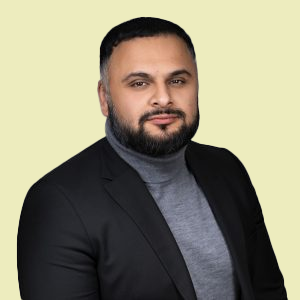
President and CEO
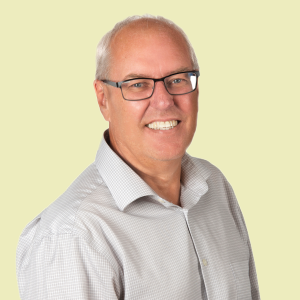
Chair of the Board

Spotlight Series
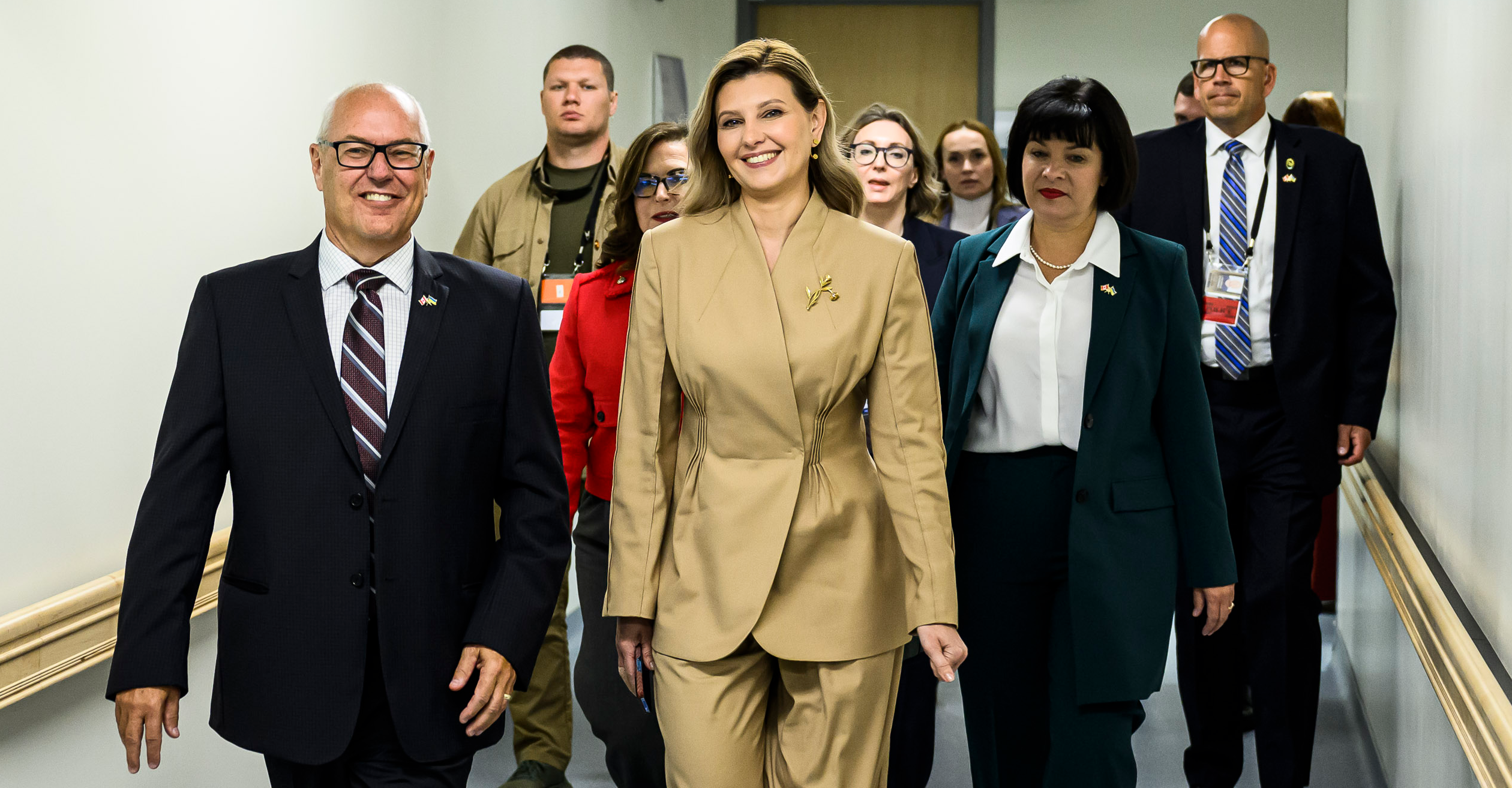
Photo credit: Justin Tang
Cal Crocker
Moments where change begins
Is it possible to pinpoint the exact beginning of an organization like Atlas? Perhaps not, but there are significant moments in time that were clear pivotal markers in its history that point to the ultimate new direction. There are few people who know this story more intimately than Cal Crocker when it comes to Atlas.
At the time of the Minister’s 2015 mandate letter announcing the creation of two new centres of excellence for Veterans’ care, including one with a specialization in posttraumatic stress disorder (PTSD) and related mental health conditions, Cal was the Chief Operating Officer at the Royal Ottawa Mental Health Centre.
When this was followed by an Order in Council in 2017 to formalize the commitment conversations started with Veterans Affairs Canada (VAC) about the logistics of where such a centre could be best located, he found himself immersed in the conversations primarily around logistics for many good reasons. The Royal where he worked continuously emerged as a natural location for such a centre — a specialized science-based research hospital for mental health and addiction in the nation’s capital, home of the Institute of Mental Health Research (IMHR), a brain imaging centre and an operational stress injury clinic.
Eventually documents were signed and the Centre of Excellence on Post-Traumatic Stress Disorder and Related Mental Health Conditions was born in 2019 with the inaugural CEO hired and a national mandate. “The concept from inception was a centre of excellence focused on research and knowledge mobilization to support leading clinical practices of care for Veterans and their Families,” Cal recalls. “In addition, we had this vast network of providers of care across Canada and wanted to see more work done in leading practices and having them available to providers to ensure that evidence-informed standardized approach to care.”
Cal was not only part of the committee that negotiated with VAC, but also was one of the original three members of the board of directors responsible for setting up the centre and recruiting the original President and Chief Executive Officer, Dr. Patrick Smith, who developed the concept. “At the time there were certainly voices who felt that VAC should be investing in direct care, but there were other mechanisms in place to provide care. The vision that was ultimately successful was the one which Dr. Smith proposed — this upstream intermediary concept. And look at the centre today. From my perspective it has really lived up to that mandate.”
“The vision that was ultimately successful was the one which Dr. Smith proposed — this upstream intermediary concept. And look at the centre today. From my perspective it has really lived up to that mandate.”
In fact, putting the right President and CEO in place at the outset is what Cal describes as the biggest win. “Putting the right people in place that bought into the culture was crucial to how the organization was visioned and developed — and how that culture has been successfully sustained.”
As someone who has spent his entire career in health care, he is clear about the necessity of managing expectations around the role of Atlas in improving outcomes for Veterans and Families. “In health care it can take years to see impact. Atlas is putting great information out there, but we have to be realistic and understand that this is too short of a timeline to know how it is being applied whether by clinicians or by members of the Veteran and Family community. That takes time.”
Where Cal does see Atlas having made an immediate and noticeable difference is in how lived experience is brought into the work. “If there is something that sets Atlas apart and makes it successful and respected it is in how listening to Veterans and Families is woven into its mandate,” he states, arguing that it is more important than in acute care due to its more chronic and persistent nature. “The mental health landscape is complex and hard to look at models that could translate across systems successfully, but I do feel that the way Atlas engages with people with lived experience and puts them at the centre across all aspects of the organization is a model that holds immense promise and could be transferable into other contexts.”
Approaching almost 10 years of involvement in Atlas’s story, from the early conversations with VAC to board member to spending the last three years as Chair of the Board, Cal says the timing is right to make his transition away from the organization. “Atlas is in a great space. Fardous and the Executive team are doing a great job. Staffing is at full complement and they are doing excellent work. They are meeting their goals and they have a strong relationship with their funder.”
As he prepares for his retirement from Atlas, it offers an opportunity to look at his contributions in important oversight and leadership to the governance of Atlas and turn the phrase: “Thank you for your service, Cal.”
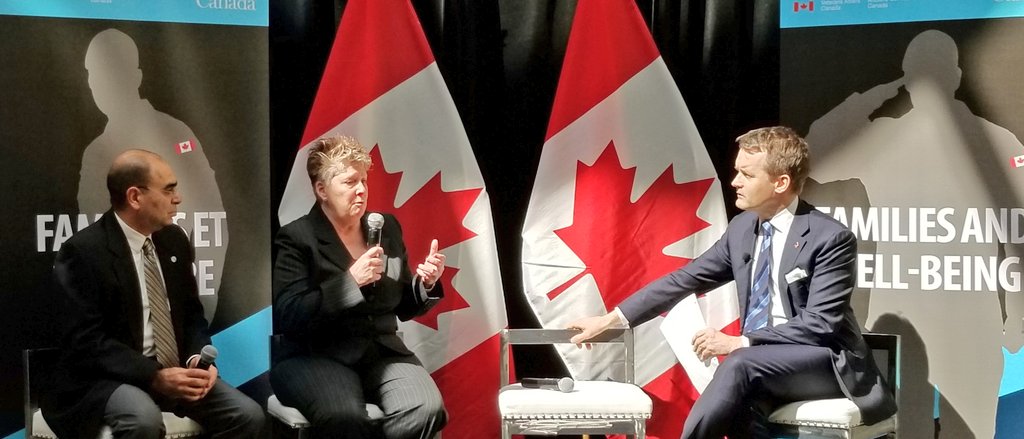


Partnerships and Stakeholder Engagement
Delivering on the priorities set out by Veterans and Families
The earliest years at Atlas were characterized by intentional growth and establishing community, culture and presence. The result is a foundation built on the principles of not only looking to the experience of those we were purpose-created to serve, but also actively collaborating with them to co-develop the plan from which Atlas would operate.
Through meaningful engagement with CAF Veterans, former-serving RCMP members, and their Family members, our entire team embraced building a plan to enact change and make a difference where Veterans, Families, service providers, clinicians and researchers who work with them could see themselves in both the architecture and in the outcomes.
What was developed was a vision for Canada’s Veterans and their Families to flourish and thrive in all aspects of life, benefiting from high-quality, comprehensive and responsive mental health services that recognize their unique expertise, needs and priorities.
Strategic directions
Four early strategic directions emerged:
- Prevent and prepare: Work with partners to strengthen upstream prevention and support for Veteran and Family health and well-being
- Improve care and support: Increase capacity across Canada for more accessible, culturally competent and trauma-informed care and support
- Expand what we know: Partner with Veterans, their Families and leading researchers to discover new horizons for care and support and widely mobilize that information
- Engage and inform: Build trusted relationships with Veterans and Families, engaging them in all key projects and processes, and empowering them with curated, trustworthy information that supports their health and well-being journeys
However, as our expertise and presence grew, we are now identifying an opportunity to further influence outcomes for Veteran and Family mental health and well-being.
We recognize that these principles are not linear and are deeply interconnected across our methods of work and levels of engagement. While they are grouped topically, you will see recurring themes emerge in the coming pages that weave in multiple directions, demonstrating how these principles show up in practice across various aspects of the work at Atlas. We welcome you to explore the highlights of achievements we believe exemplify the positive impact we are making and the meaningful change we aim to create for Veterans and Families in Canada.

Engagement: The foundation for understanding
The process is the practice
Veterans and Families have long advocated for a mental health system centred on their unique experiences and needs. The Atlas Institute’s Conceptual Framework was created to provide the key vision for a system of services and supports reflecting what was being heard from Veterans and their Families. An integral part of this vision remains working together with Veterans and Families and other system partners to design and improve services.
The “network of networks” model depicts how we operate within a much larger ecosystem. With a mandate to enhance the development and sharing of knowledge and increase collaboration, we aim to grow our relationships in response to system needs. By working with other groups we can reduce duplication and improve alignment across the broader system. We work alongside national and international organizations to foster the mental health and well-being of those who have served and their Families.

Stakeholder engagement
As a foundation for engagement, the Atlas Institute sought to co-develop a Veteran and Family engagement framework, which now serves as a system guide for partners across Canada. The team at Atlas worked with an external advisory committee composed of Veterans, Family members, researchers and service providers. Discussion groups were held with similarly structured reference groups, including members of the Atlas Lived Experience team. The team also incorporated findings from a literature review of evidence on successful engagements with Veterans and Families.
Atlas Institute CIMVHR Forum travel grant program
Since 2022, the Atlas Institute has provided travel grants to Veterans and Veteran Family members to attend the Canadian Institute for Military and Veteran Health Research (CIMVHR) Forum. The program has supported approximately 32 recipients over three, enabling participants to engage with the latest Veteran health research while contributing their lived experience perspectives.
The program aims to integrate Veteran and Family lived experiences into conversations around mental health research, leading to better understanding of their mental health needs and improved applicability and uptake of research findings. Through these travel grants, individuals who would otherwise be unable to attend have the opportunity to participate and share their expertise.
Each year features a different signature event designed to integrate guests with lived experience into the overall conference. In 2022, we hosted an interactive panel on research and lived experience, bringing these perspectives together for a facilitated discussion to foster and support mutual understanding and dialogue. In 2023, the event evolved to a high-profile networking reception that brought together the lived experience community with key stakeholders, nurturing connections between travel grant recipients and leaders in Veteran health research and policy. In 2024, we held a roundtable to explore barriers to mental health care for rural and remote Veterans and Families and possible solutions.
Feedback from the 2024 survey completed by travel grant recipients who attended the CIMVHR Forum has been overwhelmingly positive, with 100% of recipients reporting they benefited from attending the Forum. Recipients reported learning new information about Veteran and Veteran Family mental health, as well as their own mental health, while making valuable networking connections.

Spotlight Series
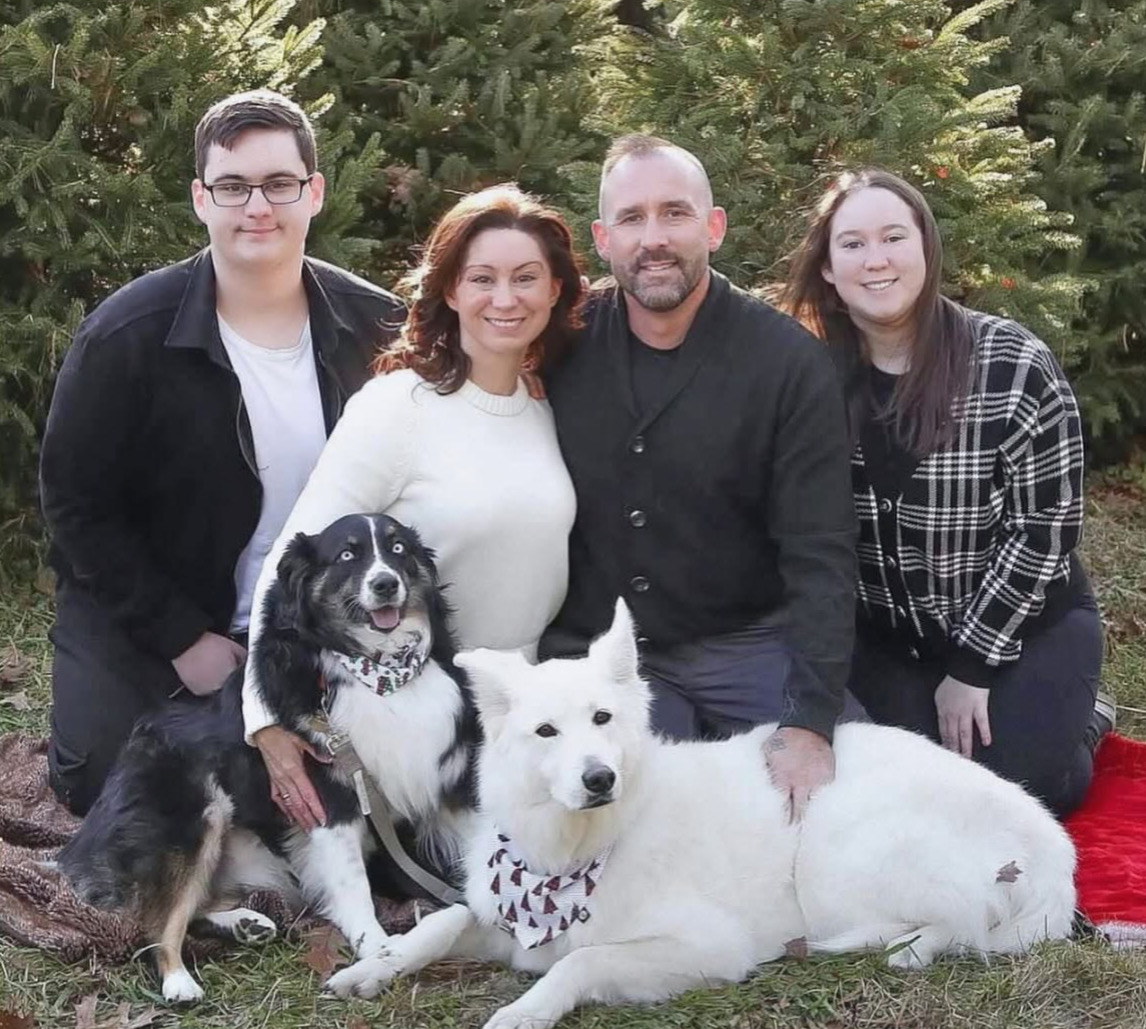
Andrew Gough
The force multiplier effect of recovery
In what can be described as more of a calling than a career for those who enter the military and first responder communities, they serve, protect and keep citizens and communities safe. And through it all, they face a high likelihood that the conditions of their work will result in a mental health injury.
For CAF Veteran and medically released police sergeant Captain (Ret’d) Andrew Gough, it is not a matter of if you will experience an event that will change you without your consent, but when.
Himself no stranger to the psychological costs of service, Andrew uses the lessons he’s learned to publicly advocate for better understanding of both the risks and opportunities that almost 25 years of wearing one uniform or another can bring to light.
Reflecting on the importance of early education for new recruits and their Families, and for those who find themselves immersed in the experience at any stage, he says one of the most important lessons he wants to impart is knowing when to ask for help and recognizing the strength it takes to make that call.
Andrew regularly uses the term “change-maker,” yet it’s not clear if he fully sees what a positive change-maker he himself has become in putting a public face and story to posttraumatic stress disorder in the community of those who serve. In doing so, he provides the beacon of hope many look to when they first realize they may be experiencing the mental health impacts of their work.
The “force multiplier effect” is a well-understood concept in the military that refers to factors which when combined considerably strengthen the effectiveness of a unit or group, allowing them to achieve greater success than expected based on their size or resources alone.
As you spend time with Andrew, you quickly come to realize how this model factors into his ongoing journey of addressing the mental health challenges resulting from his time in both the CAF and the London Police Service. Affected by injuries sustained by acts of terrorism while deployed in Tripoli, Libya during Operation LOBE in 2014, this was further amplified by a career of exposure to dangerous and traumatic events while policing. The cumulative toll of a career of exposure to traumatic events eventually led to a diagnosis of complex posttraumatic stress injury (PTSI) in 2015. Ten years later, he continues working on his recovery alongside his wife Elizabeth, navigating both healing and advocacy work as a couple and a Family.
Andrew’s introduction to Atlas came when Elizabeth participated in a panel exploring compassion fatigue in Veteran Family members at the Veteran Family Summit in 2024. Together they have been guests on Atlas’s Mind Beyond the Mission podcast and received Atlas travel grants to attend the CIMVHR Forum where they explored opportunities for learning and informing research through a lived experience lens. Since then, Andrew’s engagement has grown to support the development of resources including the Parenting with a PTSI series, a topic he is personally passionate about. He also recently co-hosted a Mind Beyond the Mission podcast on posttraumatic stress in first responders.
His time and involvement with Atlas has been, in his words, a trust-building experience, as it has proven to be a safe place. “Trust is one of the primary elements of connection. Injured soldiers and police officers often experience lack of trust as an occupational hazard. If we don’t feel safe, we will disconnect.” Like stepping stones, each piece of engagement has led him to another.
His motivation is multifaceted. It is clear Andrew is drawn to service, as evidenced by the years he spent both with the CAF and the London Police Service and his ongoing work of tirelessly championing awareness and increased understanding of mental health challenges. But beyond that, there is a deep, abiding love for his Family that weaves itself into every aspect of his life. When he speaks of Elizabeth or their children, you begin to understand the true “why” that keeps him focused on his recovery journey.
This acknowledgement of how essential Family is, both personally and from a system level, singularly drives his passion to successfully manage his mental health and experience life again, even in its discomfort. “Our trauma is their trauma,” he explains, adding “With a mental health injury you live, but you don’t experience. I need to step out of that mindset to grow. And my Family needs me to step out of that to join them in their life.”
“With a mental health injury you live, but you don’t experience. I need to step out of that mindset to grow. And my Family needs me to step out of that to join them in their life.”
Lastly, he adds that when policy makers and decision makers fully understand how important this is, then Veterans and Families will both see the exponential benefits.
A focus on recovery. A strong united Family. Social connection. Purpose. Enter the force multiplier effect.

Network tables
We develop and maintain partnerships that are meaningful to Veterans and Families in many different ways, informed and guided by lived experience. Our five-member Lived Experience team provides oversight and insight into all our work and ensure that real-life experiences of the community inform all aspects of the work of the Atlas Institute. Having this guidance and perspective has allowed Atlas to create direct inroads into the community.
Strategic Reference Group (SRG)
The SRG consists of around 15 volunteer members at any time including Veterans, Veteran Family members, service providers and researchers, who provide strategic advice on organizational priorities and guidance on specific initiatives while serving as ambassadors on behalf of Atlas. Initiated in 2020, 75 people have volunteered as Strategic Reference Group members (and for its predecessor formation, the four original reference groups) to date, taking on this significant commitment.
Communities of practice
We have established or belong to various communities of practice that bring together partners and stakeholders united by a common interest in sharing information and improving practice related to specific topics and populations. We prioritize building these communities of Veterans, Families and mental health professionals into the governance and functioning of our network. Highlights of some of our membership can be found throughout this report. Whether hosting such as through the evidence-based therapies and Peer Support Community Network, co-chairing as with the National Collaborative on PTSD and Related Mental Health Conditions with the Canadian Institute for Public Safety Research and Treatment (CIPSRT) or membership such as in the moral injury and military sexual trauma communities of practice we maintain active involvement in areas of importance to our community. As well, we are currently leading the convening of a Global Leadership Exchange table related to military, Veteran and Family mental health.

International relationships
Global Leadership Exchange
The Global Leadership Exchange (GLE) military and Veteran table is dedicated to fostering international collaboration by promoting the exchange of information and expertise on military and Veteran mental health across a global network. Members come from diverse contexts, yet are united by several key priority areas. Members collectively recognize the impact of military service on the mental health of both Veterans and their Families, viewing the transition from military to post-service life as an ongoing journey that starts with military entry, extends through various deployment phases and continues into life after service, whether the transition is planned or not. Quarterly virtual meetings provide knowledge exchange opportunities, including member updates, discussion on research and other collaborations, and the sharing of insights from Veterans and Family members.
Mental Health Research and Innovation Collaboration
The Mental Health Research and Innovation Collaboration (MHRIC) is an international consortium created in 2018 with a focus on advancing mental health research and developing policies and practices that enhance the lives of military personnel, Veterans and their Families. Bringing together thought leaders and experts from the Five Eyes nations — Australia, Canada, New Zealand, the United Kingdom and the United States — the team of experts provides high-level, evidence-based guidance to ensure research priorities, best practices and emerging issues are addressed and progressing within the Five Eyes countries. As members of the MHRIC, Atlas President and CEO Fardous Hosseiny and Deputy CEO and Executive Vice-President MaryAnn Notarianni have informed the consortium’s outputs for various subcommittees, including a committee focused on efforts related to Ukraine and another on knowledge translation and knowledge mobilization that Atlas is co-leading.
Ukraine
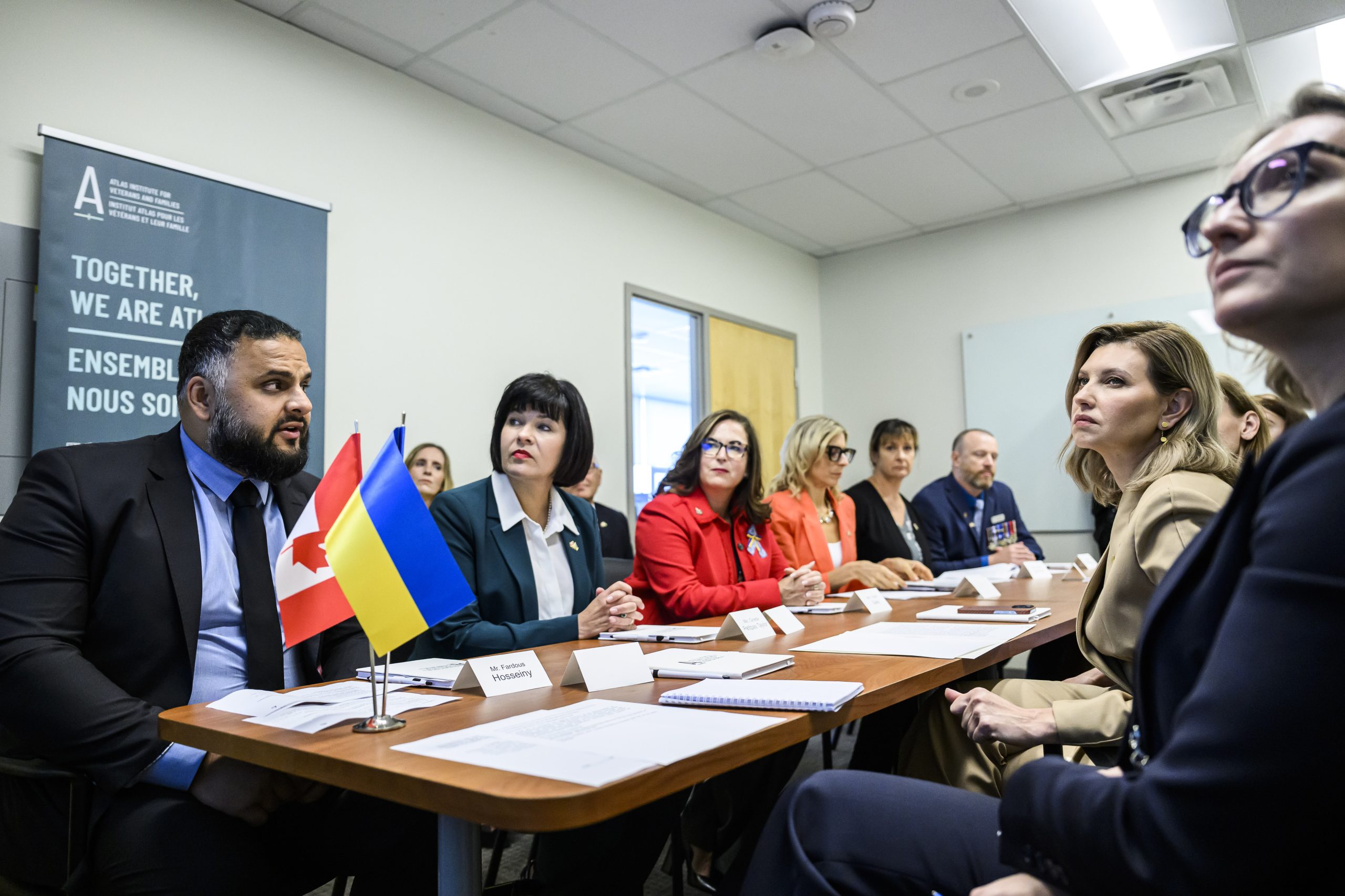
Photo credit: Justin Tang
In September 2023, Atlas welcomed a delegation of Ukrainian officials headed by the First Lady of Ukraine, Olena Zelenska, to explore international collaboration pertaining to the mental health of Veterans and their Families. A memorandum of understanding was signed between Atlas and the Lisova Polyana centre for mental health and rehabilitation of Veterans in Ukraine, formalizing a strategic partnership between the two organizations. Atlas then conducted a series of three roundtable discussions in November and December 2023 to share expertise and insights. In 2024, Atlas again welcomed a delegation of senior Ukrainian officials from the Cabinet of Ministers, Ministry of Health and other key mental health and military support organizations. Fardous and MaryAnn were invited to Lithuania as part of a team of international experts to participate in the Sakharov Conference focused on Ukraine and in February 2025 met with Ukraine’s Minister of Veterans Affairs and the Ambassador at the Invictus Games in British Columbia, along with the Mental Health Commission of Canada. Atlas continues to engage in discussions with Ukrainian government counterparts and other stakeholders and share knowledge and resources to assist their efforts to support the mental health and well-being needs of Veterans and Families.

Lived Experience
Together we can: For Veterans and Families, by Veterans and Families
Veteran Family Summit
Just as a Veteran can be affected by their time in service, Veteran Families can face challenges that impact their mental health as they support their loved ones. As such, it is crucial to acknowledge and prioritize the needs of Family members as individuals.
“I found the most encouraging piece is that a lot of what I have felt and lived through, others have too.”
— Summit participant
The Veteran Family Summit was created in collaboration with Veteran Families and those who support them to provide Families with access to knowledge, resources and supports specific to their unique perspectives.
The two-day virtual event was initiated in 2023 and has run annually since, increasing in attendance exponentially each year. Focusing on the needs and experiences of CAF and RCMP Veteran Families as well as serving Families, it offers a unique opportunity for service providers and clinicians to learn how to best support the Veteran Family community.
“The most important thing I took away was the importance of recognizing that resilience does not mean not-affected. With positive Family experience, trauma does not mean that Families will fall apart.”
— Summit participant
Registrants
Survey results
In our 2025 feedback survey attendees were asked the question, “What do you think needs to be done to recognize the experiences of Canadian Veteran Families?” Here is what we heard:
Listening tour: Where do we go from here?
Following a slower period of building during the COVID-19 pandemic, the team saw the time that followed as an opportunity to now go out and engage with Veterans and Families from coast to coast to coast. Having five members on the Lived Experience team has meant capacity to join events and intentionally use those times to broaden and deepen relationships and hear the unique stories of different representative segments of the CAF and RCMP communities. It was now the time to listen to their experiences and of the uniqueness of the challenges they faced, whether they served in the Army, Navy, Air Force or the RCMP, they were posted in the North or other regions of Canada, or had served in various conflicts. To date, our team has travelled to Borden, Charlottetown, Esquimalt, Fredericton, Halifax, Iqaluit, Kingston, London, North Bay, Ottawa, Shilo, Whitehorse and Vancouver.
Cadre
Veterans and Family members with an interest in specific aspects of mental well-being and factors that influence it can provide additional input by becoming members of the Lived Experience Cadre. Without having to commit long-term or to regular meetings, participants can still make a difference by being engaged when opportunities feel right such as advising on issues of importance to the community, informing and guiding projects and participating in surveys, panels, webinars and town hall events.
Since its inception in 2022 the Cadre has advised on 65 Atlas projects.
Creating safe places for real stories
When we embarked on our strategic planning process we heard unequivocally from Veterans and Families that it wasn’t about special treatment in any way. Their wish was that Canadians could understand what their service has meant. To help bridge that gap, we developed platforms where they could safely and authentically share their stories: the Mind Beyond the Mission podcast, the Perspectives blog and the digital stories video project. Building understanding, one shared story at a time.
All were launched in 2022.

Spotlight Series
Josh Muir
Connecting through stories: The power of authentic voices
Resilience can be understood in four dimensions — physical, mental, emotional and social. For soldiers, any and all of these dimensions can be impacted by their service. Infantry soldier Josh Muir served in multiple infantry units including the Seaforth Highlanders of Canada and was medically released due to injuries sustained in Afghanistan. For Josh, while each dimension of resilience was part of his story of challenge, his ability to tap into them in various ways also became part of his story of change.
Josh now shares this story authentically and vulnerably with other Veterans. His hope is the lessons he’s learned through the damage inflicted on his own life while using alcohol to address his pain might help “short-circuit” and prevent similar experiences for others.
The physical injuries caused by an improvised explosive device (IED) explosion while on foot patrol and while carrying a fellow soldier to safety began the series of events that would not only disrupt his life but fundamentally and irrevocably change it. Surgeries, pain, medication, alcohol, rehab, relapse, release, relationship changes and then finally sobriety and recovery spanned more than a decade.
There is a saying that true healing begins when you are able to speak from the scar and not the wound. Josh took an important step in his healing journey when he participated in a digital storytelling workshop at Atlas. The workshop is a facilitated process whereby a small group comes together using multimedia elements such as photos, audio and video to create and share their experiences in a compelling and engaging way — telling their own stories in their own words. Their handprints are embedded on every part of the process from the written and visual elements to the final short professional quality video.
Josh had been asked to participate in a workshop two years earlier and had declined, knowing he wasn’t in the right place emotionally. This proved to be fortuitous as another important opportunity emerged with the Veterans Transition Network, where Josh went through a process called enactment, something which he credits as creating a profound shift in his own thinking.
“Today, one day at a time, I live in the gratitude of the good that has come by choosing to believe that there is still so much more to experience in my life than the pain of those moments.”
“I realized that there was something in all of this that was useful for others, instead of just for myself,” Josh says. “I can shift back and forth and see how this fits into the bigger picture.” When the second opportunity to participate in the digital storytelling workshop at Atlas arose, he felt not only ready but extraordinarily fortunate.
A few months after the workshop, the stories were publicly screened. When asked how it felt to have these previously private aspects of his life now out in public, he said he felt no emotional weight attached to it. “It honestly felt good. Those close enough to me already knew it. It is all fact and documented. Living with this in the shadows is what kept me sick and unwell.”
That sense of raw honesty may be one of the reasons why the community has responded to Josh’s story, as evidenced by a remarkably high number of views and downloads. Many aspects of Josh’s story resonate on multiple levels, whether through the lens of a Veteran, a Family member, or someone working in support roles such as service provision or clinical care. In those few short minutes, the video offers a glimpse of what led him to his darkest moments and where he found the strength and resilience to rebuild a new life.
The storytelling workshop became a turning point for Josh, who is now an engaged volunteer at Atlas. He attended the CIMVHR Forum where he learned more about global research in the military and Veteran space, has shared his journey on the Mind Beyond the Mission podcast, and plans to join the Lived Experience Cadre of volunteers that have the option to join various projects, from research advisories to resource development, among others. Josh also remains involved in his local community in Vancouver, where he was recently awarded the King’s Coronation Medal specifically for his contributions to the Veteran community.
Josh will be the first to tell you that recovery isn’t a straight path with no one single solution. But you can have a hand in your own miracle when the right people, the right places and the right timing all align. “Today, one day at a time, I live in the gratitude of the good that has come by choosing to believe that there is still so much more to experience in my life than the pain of those moments.”

Implementation
A science-based approach to improving outcomes
Applying implementation science to improve service provision for Veterans and Families
Recognizing that Veterans have unique experiences, cultural norms and health needs, treatment interventions should reflect this to be relevant and acceptable within their specific context.
Involving the Veteran, their Family members, as well as those providing care such as clinicians and other service providers in conversations around the development of appropriate treatments is a way in which implementation science can ensure their perspectives are considered and the interventions are tailored to meet their needs.
To support this process, Atlas initiated a series of surveys in 2020 called the needs assessment survey to better understand the unique requirements of those providing mental health care to Veterans and their Families in implementing evidence-based practices, including training needs and preferences. The surveys targeted operational stress injury (OSI) clinics, select peer support organizations as well as independent mental health service providers and organizations focused on serving Veterans and Families. The results of those initial surveys supported the tailoring of our capacity-building offerings to meet the needs of providers related to improving care.
It is our long-term hope that Veterans and Families will have a better understanding of their care options, know what to expect when seeking care and have access to a variety of evidence-based treatment options available to them regardless of where they live.
Live virtual training
Each year we incorporate feedback to improve and streamline registration and training and in 2023-24, we reviewed our processes with a specific lens on equity, resulting in changes such as a dedicated equity stream for registration. Additionally, we recognize that it is one thing to learn about different practices and another to ensure folks continue to apply what they’ve learned, which is why we offer an optional group consultation component for training participants. We have also launched an evidence-based therapy community of practice that allows practitioners to come together to learn from their peers about what it means to practice evidence-informed care in the Veteran and Family community.
We will continue to build on these services in coming years with the launch of a mental health consultation program for service providers and implementation support projects, as well as learning from the findings of an updated service provider needs assessment survey to continue to inform future offerings.

Spotlight Series
Dr. J Don Richardson
Living the values of cultural competency
Working with psychologically injured Veterans takes a special skill set: empathy, understanding of their unique needs, specialized knowledge of the resources available to them and perhaps most importantly, the ability to honour their service by being willing to listen without judgment.
Dr. J Don Richardson has spent his career honing his craft, building the competencies and developing the expertise to earn this trust which he describes as a crucial building block to providing the specialized treatment required for service-related injuries. With over 25 years of dedicated experience, Dr. Richardson is a leading figure in the field of military and Veteran health. His research is at the forefront of advancing the understanding and treatment of PTSD and OSIs, contributing significantly to improved clinical practices and patient outcomes.
It is that expertise — coupled with his compassion and deep insights into the challenges at both the individual and system level — which earned him a spot at the table in the earliest days of envisioning a centre of excellence on PTSD and other mental health conditions.
While Veterans and Family members rightly advocated for meaningful support to address injuries sustained as a result of their service, determining what that support would ultimately look like in practice served as a real challenge.
“Our responsibility does not end with acknowledging Veterans’ injuries — it begins there.”
Dr. Richardson recalls early conversations initially focused on a bricks-and-mortar approach: a physical facility where Veterans could go be seen, heard and understood, and have rapid access to treatment. However, the reality was that Veterans were used to a unified system of care from their time in the CAF. In comparison, Canada’s health care system operates fundamentally differently in the civilian world. Further to that, OSI clinics already existed across the country.
So, the conversation shifted to upstream care. “What if a centre worked upstream at a system-level view? Why not create a centre to pull things together, provide leadership and to boldly take charge of improving care for Veterans?” These are the questions Dr. Richardson recalls being asked, and this vision was one of two presented to the government. This vision of a centre operating at a systems level is what the government ultimately chose and is the origin story of the Atlas Institute for Veterans and Families.
“Military PTSD is different. They have been injured through their service and there is an obligation to create a system where people are properly trained and culturally competent to treat them. And that takes time.”
Dr. Richardson has been with Atlas from its infancy and continues to be involved to the extent that within the organization, he is simply known as “Don.” From his participation in the Atlas reference groups since their inception and his focused leadership on moral injury, to his current role as Medical Advisor, his passion for this community continues to guide his work. He says that working with Veterans and Families has been a part of his entire career and it is a community from which he has learned a great deal.
“Military PTSD is different,” he says. “This is a community where a great many people have been traumatized because of the conditions of their work. The concept of ‘unlimited liability’ — the idea that they can’t just not show up for work, they can’t refuse — is so difficult for people outside of the military world to understand. They have been injured through their service and there is an obligation to create a system where people are properly trained and culturally competent to treat them. And that takes time.”
Part of that solution, Dr. Richardson believes, lies in trust. “Veterans often have a different level of trust due to their experiences, and that mistrust can be transferred to other organizations. To address this, an environment of trust that encourages Veterans to take part in shaping solutions is vital.”
Authentic engagement, he says, is one of Atlas’s greatest strengths that contributes to its success. “By truly engaging with Veterans and being driven by the needs of Veterans and Families, by actually hearing their story of how they got here, you earn their trust.” He adds this is not limited to the Veteran and Family experience, but extends to his interactions and engagement as well. “I feel I have something to contribute, and I am valued for what I share. This doesn’t mean everything I say will be acted on. But I know it has been considered alongside other perspectives, and I always have felt certain of the value of these interactions. This drives me to continue my engagement.”
As Atlas officially celebrates its fifth year, Dr. Richardson reflects on the organization’s growth from a vision to reality and acknowledges how much work remains to create the system this community so rightfully deserves.
“Atlas’s first five years show that partnering with Veterans and their Families is anything but a token gesture — it is the engine that drives everything we do,” says Dr. Richardson. “Our responsibility does not end with acknowledging Veterans’ injuries — it begins there. True progress comes from matching their courage with a support system that is just as bold and culturally attuned, one that ensures every Veteran and Family member feels seen, heard and valued.”

Knowledge Mobilization
Moving evidence into action
Resources for the community
One of the most important roles at Atlas is ensuring information gets into the hands of Veterans and Families in formats that are easy to use and understand. This helps to increase awareness, enhance knowledge and understanding, build skills and capacity and promote the use of mental health services. We decide on the topics from multiple points of input, including the Strategic Reference Group, advisory committees, the Lived Experience team and available evidence such as findings from a research and knowledge gap analysis, literature reviews and environmental scans to understand what information is available to be mobilized.
Since inception, we have developed resources covering topics across a wide spectrum, including how to navigate various aspects of living with PTSD and PTSIs, moral injury, military sexual trauma, intimate partner violence, problematic anger, peer support, suicide prevention, and youth-specific resources through our MindKit initiative. We are currently developing a PTSD treatment decision navigator, as well as resources on cannabis use and sleep. We are also working to create population-specific resources for First Nations, Inuit and Métis Veterans as well as for retired RCMP members and their Families, adult children of Veterans and women Veterans.
All of our resources are available on our website and are shared through our social channels. They are also printed and distributed through mailouts and featured in advertisements with QR codes, making them easy to access.
The co-creation approach
Mobilizing knowledge is much more than simply sharing information — it involves planning, resources and a clear understanding of the target audience and their needs. What better way to do this than by using a co-creation approach?
What this means is that Atlas aims to fully engage Veterans and Family members from both the CAF and RCMP communities in every aspect of the projects we undertake. From project design to execution and public launch, we ensure authenticity is embedded across every element of the plan. This is something the team at Atlas has built and refined over time, adding in practices and modifying approaches as we learn more about how Veterans and Families like to be engaged, and as we also explore new topics and work with Veterans and Families of various backgrounds and experiences.
The process has been incredibly impactful for those who are involved, often giving participants a space to share their expertise and help the greater Veteran and Family community, to connect with others with similar experiences and wisdom to impart, to contribute to something larger and gain skills in the process, while also being a vital part of creating informational resources that are relevant in both content and design, maximizing our ability to meet the informational needs of the community.
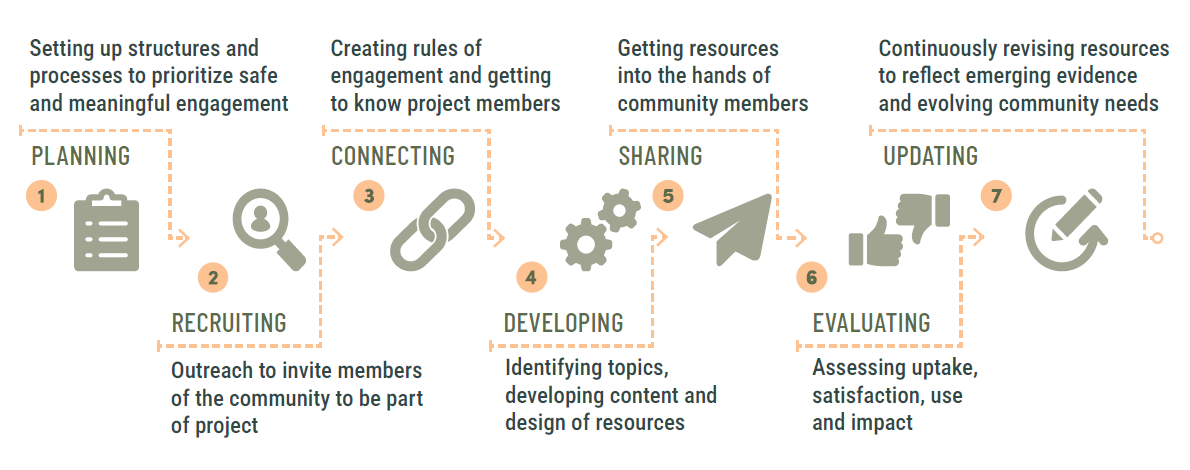 This model has proven so successful that it has offered opportunities for us to present on our co-creation approach at conferences and help others leading knowledge mobilization work do so in a similar way. We also describe our co-creation efforts when we disseminate our resources to individuals and organizations working in the Veteran mental health space, as there is interest in learning about this approach and its impacts, and indications that others in the community may be beginning to explore taking on similar approaches in their own work. In this way, we are not only doing the work ourselves but also building capacity among others in the sector.
This model has proven so successful that it has offered opportunities for us to present on our co-creation approach at conferences and help others leading knowledge mobilization work do so in a similar way. We also describe our co-creation efforts when we disseminate our resources to individuals and organizations working in the Veteran mental health space, as there is interest in learning about this approach and its impacts, and indications that others in the community may be beginning to explore taking on similar approaches in their own work. In this way, we are not only doing the work ourselves but also building capacity among others in the sector.
Mobilizing Atlas-led and funded research efforts
In addition to drawing from existing evidence and information to develop practical resources that support Veteran and Family needs, the Atlas team also works to increase access to novel research findings by developing plain-language outputs such as research summaries, webinars and brief guides.
Knowledge mobilization highlights
“Thank you so much for developing these materials. I think it is so important to have resources that are not just informative but also actionable. I believe it may take some of the pressure off the Family to have all the answers and may increase confidence in Family members to have these necessary but difficult conversations.”
Suicide prevention
atlasveterans.ca/suicide-prevention
Research suggests that suicide disproportionately affects CAF and RCMP Veterans, and their Family members may also be at a higher risk of suicide compared to the general public. Preventing suicide and promoting mental health among Veterans and their Family members is vital. Atlas partnered with the Centre for Suicide Prevention to develop a suite of resources specific to the community. Released in early 2024, it includes two practical guidance documents, an infographic for having conversations about suicide and an accompanying wallet card. It also contains some quick facts and statistics about suicide and a short list of additional resources.
- 7,107 downloads
- 6,711 page views
- Hundreds of printed copies distributed
Youth mental health: MindKit
For youth who have loved ones who serve or have served in the military and RCMP, PTSIs and OSIs are realities they often face due to the nature of their Family members’ work. Yet, the impact on the young Family member is often overlooked. To help these young people better understand what their Family members may be going through and learn how to support themselves, in 2023 Atlas launched a website — mindkit.ca — created for and by young Family members of Veterans impacted by PTSIs, in collaboration with service providers who work with Veterans and Families. The site includes youth-friendly tools, strategies and downloadable resources, as well as real-life videos from children of Veterans. It also features a webcomic, audio clips and interactive tools.
- 3,100 resource downloads
- 50,000+ page views
- 5,000+ copies distributed across Canada
Peer support
atlasveterans.ca/peer-support-directory
While peer support is widely practised among military and Veteran populations to help with recovery from service-related injuries as well as with adapting to post-service life, it can be challenging to know what peer support programs and services are available to Veterans and their Families across Canada. In response to this need, Atlas launched an online directory and interactive map of Canadian peer support services using data collected by CIPSRT. The interactive webpage provides both a map and list view that details where services are located and which services are offered. To date it has had more than 10,000 views. The advisory committee that guided the project was comprised of individuals in the peer support delivery space in Canada.
Traumatic brain injury
CAF and RCMP members may be more likely to be exposed to events and conditions that cause traumatic brain injury (TBI). TBI — which refers to any kind of damage to the brain caused by applied force, including repeated impacts over time — can affect different areas of daily life, including behaviour, cognitive functioning and emotions, among others. Notably, there can be an overlap in some of the symptoms and causes of PTSD, which can lead to misdiagnosis or people not knowing that they have both TBI and PTSD.
In 2024, Atlas released a suite of four TBI resources, including an overview of TBI, day-to-day tools and strategies to help Veterans and Families care for a TBI, information on how TBI and PTSD can overlap, and a resource to help service providers offer better care to Veterans with a TBI.
- 4,600+ resource downloads
Military sexual trauma
Military sexual trauma (MST) refers to the impacts of experiencing sexual and gender-based discrimination, harassment and violence during military service. MST is a serious problem in militaries around the world and can often have lasting and profound impacts. Despite this, the Veteran community has identified a lack of practical resources on MST. Atlas recognized early into our mandate that improving knowledge and developing resources on MST would be a key priority.
As a member of the Canadian Military Sexual Trauma Community of Practice, Atlas played a key role in producing a fact sheet on MST and military sexual misconduct. In 2022, Atlas launched two resources to provide individuals impacted by MST with information and strategies to support healing. These guides were released alongside an introductory primer, an accompanying infographic and two videos designed to improve service provider understanding of the unique military and Veteran-specific factors that can affect care for Veterans who have experienced MST. In 2024, Atlas added four more resources for Family members. These resources are intended to not only help Family members learn more about MST, but also to increase their capacity to support both themselves and their affected loved one.
- 15,000+ resource downloads

Spotlight Series
Sam Nicholls
Unexpected alliances
When Sam Nicholls signed up for a course on curating difficult histories in museum spaces as part of her master’s program at Carleton University, she did not expect the course’s focus would touch her so personally and have such a pivotal impact on her life.
The final product of the course — a joint project with Atlas on PTSD — came as a complete surprise to her two weeks before the class started. When she learned of the specifics of the project, moments of worry crept in. “Is this going to be good for me? Or not?” she wondered.
At the time, her father, a CAF Veteran, was about three years into his PTSD diagnosis and two years post-rehab for alcoholism. Her Family was adjusting to what all of this meant after years of living in the grip of his undiagnosed and untreated service-related mental health challenges.
Her role in her course was meant to be that of a researcher, an outsider. And yet maintaining that neutrality proved challenging in ways she hadn’t fathomed as she found herself interviewing a Veteran and being struck by the familiarity of the story he shared of how his injury had impacted his relationships with his Family, in particular, with his children. After the initial shock and wave of emotion, Sam experienced what she describes as an immense flood of relief. It was the first time she realized there were others out there who “got it.”
Much of her father’s healing journey started post-service and because of this, Sam and her Family had little connection to the military world, including supports which might have been world-changing for the Family. “This (project) was so pivotal in a personal way. I was so distanced from the community and not aware that places like Atlas even existed. It wasn’t like we had been looped in about the benefits with VAC, especially those supports we needed, like therapies for children and Family members,” she said. “Finally, there was this opportunity to find things for myself, for my Family, for my dad and my sister.”
“We had this opportunity to share real stories. Everyone’s stories were so different, but at the same time we could all connect and understand.”
As a direct result of this project, Sam became highly engaged with Atlas. Recognizing that the young Veteran Family member is an underserved demographic, she saw this and the other work upon which Atlas was embarking as an opportunity to bring her voice and experiences in support of others, something she describes as “super healing.”
One of the first projects Sam was involved in was serving as a lived experience advisor on MindKit, a website designed for youth like her to explore things related to mental health, created for and by young members of Families with parents with PTSIs. The tips, tools and strategies would all be co-created by the youth, supported by a team of professionals to ensure that they were presenting authentic and meaningful information to youth who may use the website. Sam recalls a moment in a virtual meeting when they were looking at a comic book, specifically a scene where the father had been alerted by a loud noise. There was something about the presented scene that reflected her daily experiences, so she finally spoke up and said: “‘That actually isn’t how it is at home. Dad might be alarmed and ask, “What was that? Is everyone okay?” He was obviously startled and worried, but he wasn’t angry.’ I remember looking at the Zoom screen and seeing other people nodding in agreement. After this, I felt that comic was truly representative of our experience.” She adds, “Through the work with Atlas, I could clearly see that what I was sharing was printed onto paper and valued. That was so rewarding and so special.”
As part of the MindKit project, Sam also participated in a digital storytelling workshop in which six youth came together to share their personal stories in short videos, which were then shared on the MindKit website. She admits she was initially wary of doing it because she was worried about how her father would respond. “In the end I was really glad I did it. We had this opportunity to share real stories. Everyone’s stories were so different, but at the same time we could all connect and understand.”
She recounts the incredibly moving experience at her father’s recent celebration of life where someone he had served with came up to her. He had not seen Sam and her Family in a really long time, but he had seen her digital story in VAC’s newsletter. Even though his children were older than her and had children of their own, he shared that everything about her story resonated with them and how powerful it was to see their experiences in her story. Her participation at Atlas has had a far-reaching impact she never anticipated.
Today she stays involved with Atlas in different ways while completing school and moving into a different stage in her life and career. Her professional work is not in the Veteran and Family sphere, but she stays engaged with Atlas and serves as a member of the Strategic Reference Group. She also attended the CIMVHR Forum and recently co-presented with a member of the Atlas team on MindKit at the International Association for Youth Mental Health Conference.
Sam acknowledges that her early engagement with Atlas changed the trajectory of her life and her career. While she has gratitude for what it has meant for her personally from that perspective, it has also spurred her on to give back. She has recognized that she is able to give back in a way that can support other young people who find themselves lost and uncertain about their own mental health journeys alongside their Family member’s PTSI.

Research
Building Canadian knowledge in an international context
We design our research projects so they answer the questions that matter most to Veterans and Families.
Atlas undertakes and supports research that seeks to improve Veteran and Family well-being, driven by a commitment to better understanding their mental health needs and experiences and informed by VAC’s seven domains of well-being that include the social determinants of health.
Our research team works with academic centres of excellence to integrate military and Veteran communities into conversation about research and treatment related to mental health challenges. We now have an established research program that actively collaborates with centres across Canada and the world, positioning Atlas as a thought leader in neuroscience, psychiatry, psychology and social science research.
We now have an established research program that actively collaborates with centres across Canada and the world, positioning Atlas as a thought leader in neuroscience, psychiatry, psychology and social science research.
Current information on all the latest research news at Atlas can be found in the Research Compass newsletter, which is published in April and September each year. Research Compass is available on our website at atlasveterans.ca/research-compass or by joining our email list at atlasveterans.ca/contact.
Research Partnerships
Since its inception, Atlas has grown from a new organization with a bold vision to a national leader in Veteran and Family-focused research and knowledge mobilization. Over the past five years, Atlas has funded more than 35 research projects spanning a wide range of pressing topics including PTSD, moral injury, suicide prevention, peer support, Family systems, gender-specific health needs and the transition to post-service life. These projects reflect not only the diversity of experiences within Veteran and Family communities, but also the complexity of their care needs.
From our first year, the goal of the Atlas Institute has been to elevate the voices of Veterans and Families while generating rigorous, relevant evidence to guide system-level change. In the early days, this meant establishing foundational partnerships and investing in a wide breadth of diverse topics with diverse partners. Today, Atlas supports a growing network of researchers and lived experience collaborators across Canada and internationally, advancing cutting-edge, multidisciplinary work that is shaping practice, informing policy and expanding what we know about military and Veteran mental health.
This five-year milestone marks a moment of reflection and renewal. We are proud of how far we’ve come and energized by what lies ahead. With continued collaboration, innovation and community engagement, Atlas will keep growing our capacity to support Veterans and Families in meaningful, lasting ways.
Peer Support Community Network
In partnership with CIPSRT, Atlas established the national Peer Support Community Network (PSCN) to enhance peer support capacity for public safety personnel (PSP), Veterans and Families. The PSCN was convened with three main objectives: 1) to advance best practice guidelines; 2) to create a space for peer support network connection and 3) to facilitate knowledge co-creation and exchange on peer support. The PSCN’s 44 members include peer support providers, researchers, registered mental health professionals, PSP and their Families, as well as Veterans and their Families.
In 2025, we launched national guidelines for peer support programs offered in workplace or community-based settings to Veterans, military, PSP and their Families. The guideline, the first of its kind, has been highly anticipated within the Veteran and PSP peer support field. It can be used to inform the development of new programs or to assess and adapt existing ones, ensuring they align with evidence-informed practices. It also serves as a helpful tool for individuals seeking peer support, enabling them to evaluate the appropriateness and quality of available programs.
The guideline helps promote consistent, effective support while upholding key principles such as mutual respect and shared responsibility.
Co-Principal Investigator model
Over our five years of impact, our research model has evolved, not only in what we study, but in how we study it. From the beginning, Atlas has recognized that truly transformative research in the Veteran and Family space must be shaped by those with lived experience. Over the past five years, we have not only funded over 35 projects across Canada and internationally but also redefined what meaningful inclusion looks like.
At the heart of this evolution is Atlas’s pioneering co-Principal Investigator (co-PI) model, which brings lived experience into research leadership from the outset. Rather than relegating voices of lived experience to advisory roles or final-stage consultation, Atlas embeds them throughout, from the formulation of research questions to data collection, interpretation and knowledge mobilization. This approach has fundamentally reshaped the way our studies are designed and delivered. The result is research that is more culturally attuned, ethically grounded and deeply resonant with the communities we aim to serve.
This model has been applied in studies exploring the experiences of military Families and specialized unit members. In each case, co-PIs with direct military or Familial experience helped build trust with participants, enriched the depth of data and ensured that findings reflected the complex realities of Veteran life. Our experience shows that this model doesn’t just enhance research quality — it builds capacity, strengthens relationships and creates safer, more inclusive research environments.
The two projects currently being co-led:
- Maintaining resilience and well-being in elite military cultures: This project explores how people serving in elite military units make sense of the personal impacts of service and negotiate belonging, status, group and personal resilience and well-being.
- Adult children of Veterans: The research aims to integrate the experiences of an understudied group (adult children of CAF Veterans) within the Canadian military Family research landscape and identify positive outcomes associated with military Family life from the retrospective accounts of experience and meaning provided by the adult children participants.

Applied Research
The Applied Research team at Atlas focuses on how psychological, behavioural, structural and social factors — such as mental and physical health, age, income, housing and access to care — influence the well-being of Veterans and Families. The team combines survey-based, quantitative research and interview-based, qualitative research methods to better understand the complexities of these factors as well as people’s experiences. The team works closely with people with lived experience to design and carry out studies, ensuring the questions asked and evidence uncovered reflects the realities that matter most to the community.
The team regularly presents research findings at academic and professional conferences, publishes results in peer-reviewed journals and shares insights through articles in trade publications.
The team is also committed to training students through research assistantships and honours thesis supervisions, and provides hands-on research experience to students from the University of Ottawa and Acadia University.
In the 2024-25 fiscal year, the Applied Research team developed and launched a groundbreaking new research training program for Veterans and Veteran Family members. The objective of this initiative is to enhance familiarity with the research process as well as capacity to substantively collaborate on and advance the development of research projects. Recognizing the growing demand for lived experience engagement in Veteran and Family research alongside a gap in training opportunities, the program comprises a novel opportunity for capacity-building that equips participants with foundational knowledge and skills in study design, research question development, research methods, ethics, data collection and analysis, and the development of research outputs.
Investing in Veterans and Family members as research collaborators and partners, this program is designed to foster long-term interest and engagement in research by cultivating confidence, critical engagement with current research, and fluency in research terminology and processes, with a view towards enhancing the quality, relevance and impact of studies to which Veterans and Family members contribute. The first cohort was welcomed to the program in February 2025 and planning is underway to identify what the second offering will look like.
In 2024-25 we launched a new study about women’s experiences of transition to post-service life, which supports momentum-building in, and the advancement of, our women Veterans’ research program. In October 2024, we launched the study in partnership with the Canadian Legacy Project, focusing on transition experiences of women who released from the CAF. The project takes a multidimensional approach, examining the psychological, social and economic factors that shape transition experiences and outcomes, as well as exploring patterns of service access and use among women Veterans. Uniquely, this study also asks participants about how they define a successful transition to contribute to the conceptualization of transition to post-service life and to support gender-responsive and person-centred approaches to this phase of life. Data collection is currently underway with the goal to release findings throughout 2025.
Finally, this fiscal year marked the launch of a forward-looking study on thriving after service, which explores what it means for Veterans to flourish in life after service. Flourishing is a vital, multidimensional aspect of mental health and well-being, but it is not widely studied in research with Veterans. This project represents an important first step toward the integration of mental health promotion into Veteran well-being research. This study shifts the focus toward a strengths-based perspective and seeks to understand the factors, traits and characteristics that support flourishing among Veterans. What makes this study unique is its proactive approach asking what supports Veterans in feeling fulfilled and purposeful. Data collection is currently underway and this project is set to contribute novel insights to support more holistic approaches to Veteran well-being and support systems.

Clinical Research
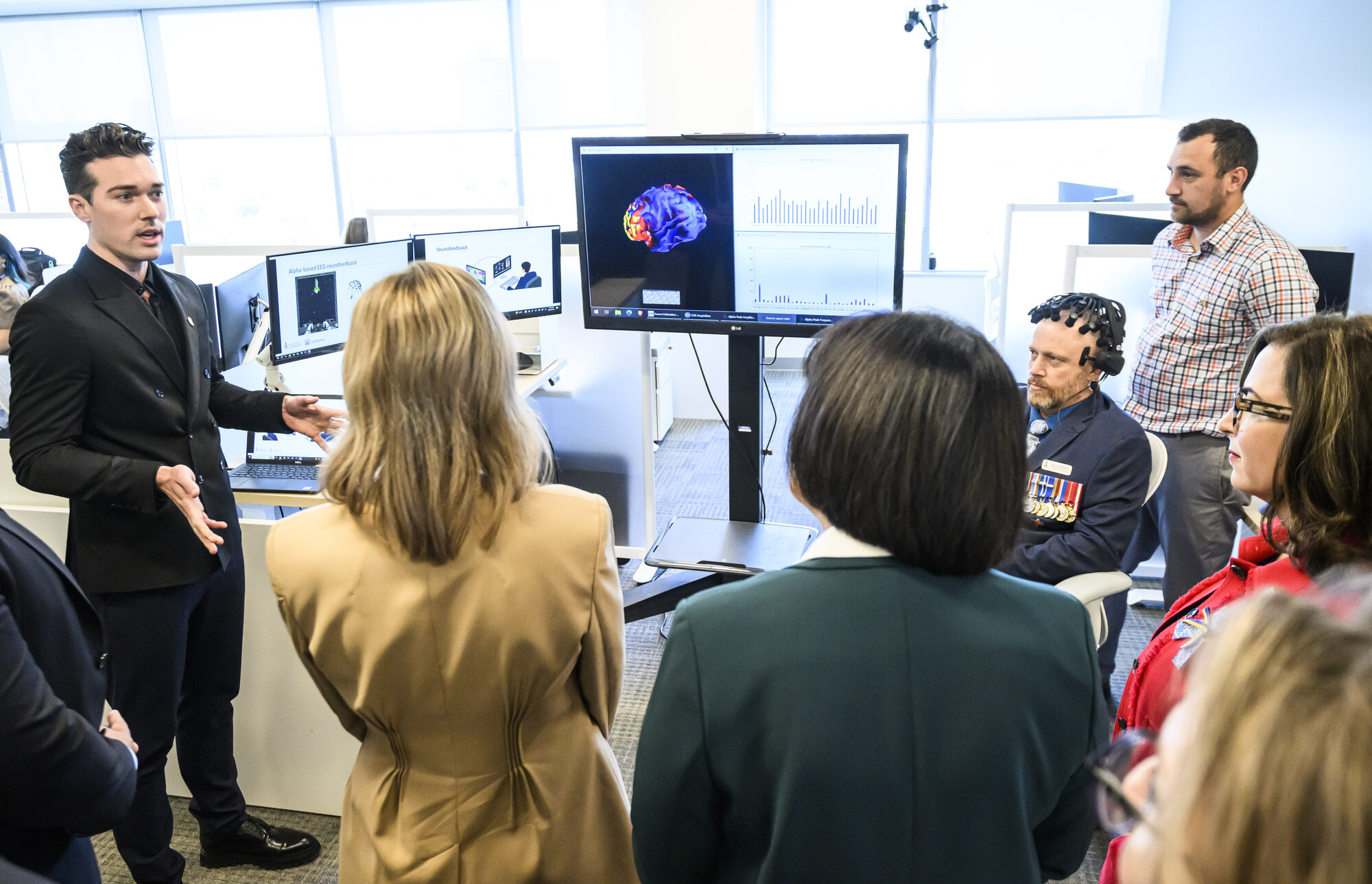
Photo credit: Justin Tang
The Clinical Research team at Atlas was established in 2022 with a vision to explore the intricate relationship between brain function, mental health, well-being and treatment response. This has involved building a team from the ground up of graduate students and research staff to support large-scale research initiatives, such as randomized controlled trials for novel PTSD therapies. The team is fostering the next generation of clinician-scientists from the University of Ottawa, McMaster University, Western University, the University of Toronto and international universities. Since 2022, the Clinical Research team at Atlas has produced 33 research manuscripts, with 25 of them published in peer-reviewed journals on topics surrounding neurofeedback therapy, emerging treatments for PTSD, trauma-related disorders in marginalized groups, neuroimaging analyses and mental health challenges.
One of the foundational research priorities in our Clinical Research lab is the ongoing exploration of the use of neurofeedback to support those experiencing PTSD. Our real-time functional MRI (fMRI) neurofeedback randomized controlled trial study for PTSD investigates how neurofeedback can help individuals learn to regulate brain activity in response to emotion-invoking stimuli and examines how such training impacts brain networks and the experience of PTSD symptoms. The team has published a research article that points toward neurofeedback therapy being an evidence-based mind-body treatment to improve mental well-being for military members and Veterans who are affected by PTSD. In this study, we found that 60% of participants who received neurofeedback therapy no longer met criteria for having PTSD at the three-month follow-up, with significant decreases in PTSD symptoms after receiving neurofeedback treatment.
Notably, the Clinical Research and Implementation teams at Atlas are collaborating to provide accessible training on using neurofeedback to service providers who care for military and RCMP Veterans and Families. Over time, the neurofeedback work at Atlas has expanded to include new protocols and EEG-based interventions, as the team continues to explore the implications of these findings and develop new projects to further study neurofeedback’s practical applications.
Our Clinical Research team has also spearheaded new research developments, specifically the couples and secondary traumatic stress (CaSTS) study, which examines how partners of Veterans with PTSD experience secondary traumatic stress (i.e. stress response from indirect exposure to traumatic experiences), its effects on the brain and impacts on daily life. This research uses a combination of neuroimaging, EEG and qualitative interviews, with the goal of illuminating how trauma can impact military Families, contributing knowledge to guide Family-centred interventions and policy development for PTSD-affected communities.
A fundamental focus of the team’s research is the investigation of the neural circuits underlying PTSD and trauma-related disorders. Advanced neuroimaging analyses are incorporated into many studies to understand how trauma and PTSD affect brain structures. Importantly, the team discovered unique PTSD-related brain networks that differ between biological sexes, offering guidance for sex-specific PTSD treatments, which can have valuable applications in a military context.
Understanding sex and gender differences is also of key importance in our minority mosaic study, which investigates trauma and identity within underrepresented and marginalized communities. This study examines the lived experience and neurobiological impacts of minority stress, particularly affecting 2SLGBTQIA+ individuals and ethnic and racial minorities — including military and Veteran populations and survivors of the LGBT Purge, as well as civilians. Through both qualitative interviews and neuroimaging, the team began mapping how chronic stressors linked to identity influence moral injury and mental health outcomes. A critical component of this research is our collaboration with LGBT Purge survivors who offer guidance to support our research objectives, analyses and interpretations.
Dr. Andrew Nicholson, Clinical Research Director at Atlas, also launched a new graduate-level course in clinical neuroimaging at the University of Ottawa, which discusses the mental health challenges that affect military communities and how neuroimaging technologies can be used to address them. Here, graduate students are trained on neuroimaging methods and analyses, including an exploration of PTSD subtypes, whereby all clinical examples used are drawn from our team’s work examining PTSD in Veteran communities. In addition, Dr. Nicholson championed the development of a Mental Health Equity Consortium at the University of Ottawa in service of the 2SLGBTQIA+ community, which bridges equity, diversity and inclusion initiatives at Atlas, the University of Ottawa and the Royal.
The team is building a voice in trauma-informed, identity-sensitive neuroscience research by contributing to national and international forums and symposia on Veteran-centred health. This has helped bring brain-based treatment approaches into real-world conversations about trauma, identity, intersectionality, mental health and recovery.
“The Atlas Institute brings forward the voices of LGBT Purge survivors, whose perspectives have too often been left out of Canada’s history. Research at Atlas exposes how minority stress and discrimination affect the brain and well-being, revealing the deep costs of societal marginalization endured by minoritized groups, including LGBT Purge survivors.The institute also supports innovative approaches to care and healing for these extraordinary Veterans and public servants.”
— Michelle Douglas, Executive Director at the LGBT Purge Fund

Spotlight Series
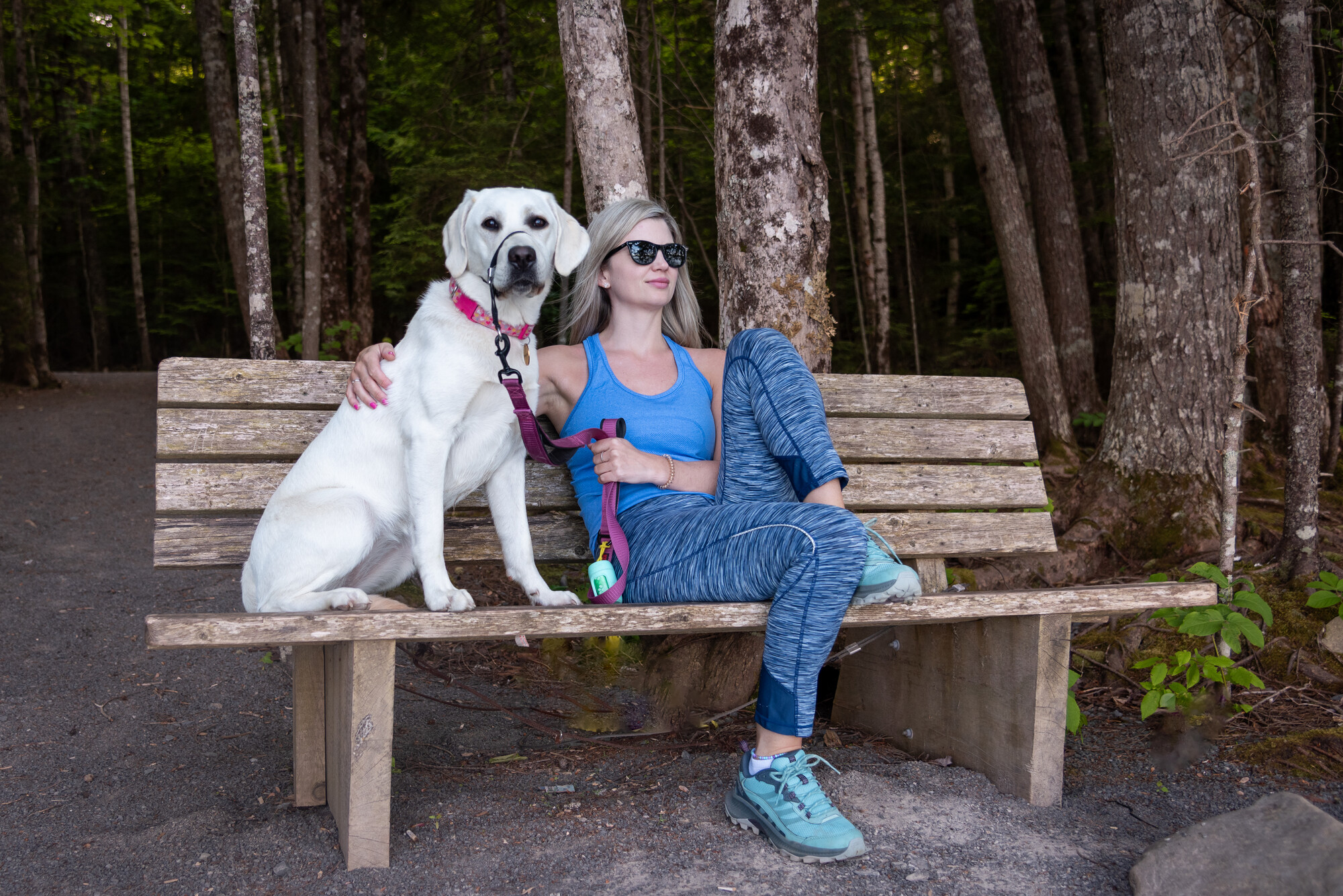
Photo: Allison Smith, Dandelion Digital
Corporal (Ret’d) Sarah Lefurgey
Finding purpose through engagement
For Corporal (Ret’d) Sarah Lefurgey, leaving the RCMP felt like the end of a defining chapter, one that left a void she was unsure could ever be refilled — that is, until she discovered new meaning and direction by joining the Athena Project at Atlas.
The idea of lived experience engagement was entirely new to her, something she hadn’t encountered before. So when a close friend and fellow Veteran shared a call for volunteers to join a working group of women Veterans from the CAF and RCMP — focused on research, connection and advancing the well-being of women Veterans — it sparked a sense of possibility she hadn’t expected.
“Discovering Athena and Atlas was a turning point — they were catalysts that unlocked new doors, broadened my thinking and uncovered opportunities I’d never imagined. In that moment, my passion and purpose expanded my thinking and revealed opportunities I could not have imagined. My passion and purpose were reignited.”
Though she was stepping into the unknown, she decided it was worth exploring, applied and was one of the original 14 women chosen for the project that would bring her unique voice, knowledge, skills and expertise to ensure the research Atlas undertakes reflects the needs and priorities of this group.
“Policing was where my passion and purpose intersected, and when I left the Force, that deep fulfilment faded with it,” Sarah says. “Discovering Athena and Atlas was a turning point — they were catalysts that unlocked new doors, broadened my thinking and uncovered opportunities I’d never imagined. In that moment, my passion and purpose expanded my thinking and revealed opportunities I could not have imagined. My passion and purpose were reignited.”
“I can say Atlas is leading the way through their transformative approach, treating lived experience as what it is: genuine expertise in this subject matter.”
She describes being in the interview process with the two Principal Investigators, Dr. Sara Rodrigues, Applied Research Director at Atlas, and Dr. Kate Hill MacEachern, and the sense that while the credentials she had amassed in the RCMP as a subject matter expert in interviewing children as part of the Major Crimes Unit might not be fully transferable, her thoughts and ideas were valued and could still have use in a very meaningful way.
For Sarah, participating in the research process is a way to make a purposeful impact. She believes that Atlas’s model of incorporating lived experience offers far-reaching benefits. “When it comes from the first-person voice, there is a benefit in two ways: people with lived experience are able to give voice to things they believe are important, and for researchers, the lived experience voice strengthens what they’ve set out to do.”
She recalls the experience of crafting the survey questions for the Athena Project. Sarah said that while the original questions from the researchers were important, engaging the lived experience advisory group of CAF and RCMP Veterans to refine them allowed both the content and language to genuinely resonate with the intended audience — CAF and RCMP Veterans. Not only this, but when the findings are released, the lived experience community also has the connections to be able to share the findings and mobilize the knowledge to a community that might not otherwise be accessible if it were strictly limited to those within the research world. “I have come to realize through attendance at the CIMVHR Forum and with other Veteran-serving projects that Atlas’s approach of embedding lived experience is an anomaly rather than the norm. I can say Atlas is leading the way through their transformative approach, treating lived experience as what it is: genuine expertise in this subject matter.”
Sarah explains that many people who enter helping professions like policing do so with a deep desire to improve society. Participating in research allows them to reconnect with that core motivation that initially inspired their careers. For some, like Sarah, it becomes an extension of their purpose, helping to fill the sense of loss they experience when their careers are cut short, often due to injury.
While Sarah joined Atlas through the Athena Project working group she has also contributed in many other ways. These include a Perspectives blog post on RCMP members’ repetitive traumas and treatment needs, a Psynopsis submission in collaboration with Dr. Kate Hill MacEachern to the Canadian Psychological Association, supporting the development of resources for RCMP Families as part of the advisory group, and the completion of a Veteran and Veteran Family research course developed by Dr. Sara Rodrigues. In March 2024, she was appointed to the Minister of Veterans Affairs Canada’s inaugural Women Veterans Council, which has a mission to champion the voices of women who have served Canada and provide advice and recommendations on a wide variety of issues facing women Veterans.
Sarah carries an outward persona of quiet confidence. It’s something she says was a necessary skill for her career, yet she recognizes it is also one of the hallmarks of the invisible injury of PTSD, a result of repetitive traumatic exposures over the course of her service. “You are trained to always be composed. But concealing emotions can be incredibly harmful when you are struggling because it creates this misguided belief that you have to struggle in silence.” Today, she draws on her experiences as a police officer to transform systems for Veterans, boldly sharing her story and becoming a powerful force for change at both local and national levels.

Public policy
Shaping the future
Public policy: Expanding our impact
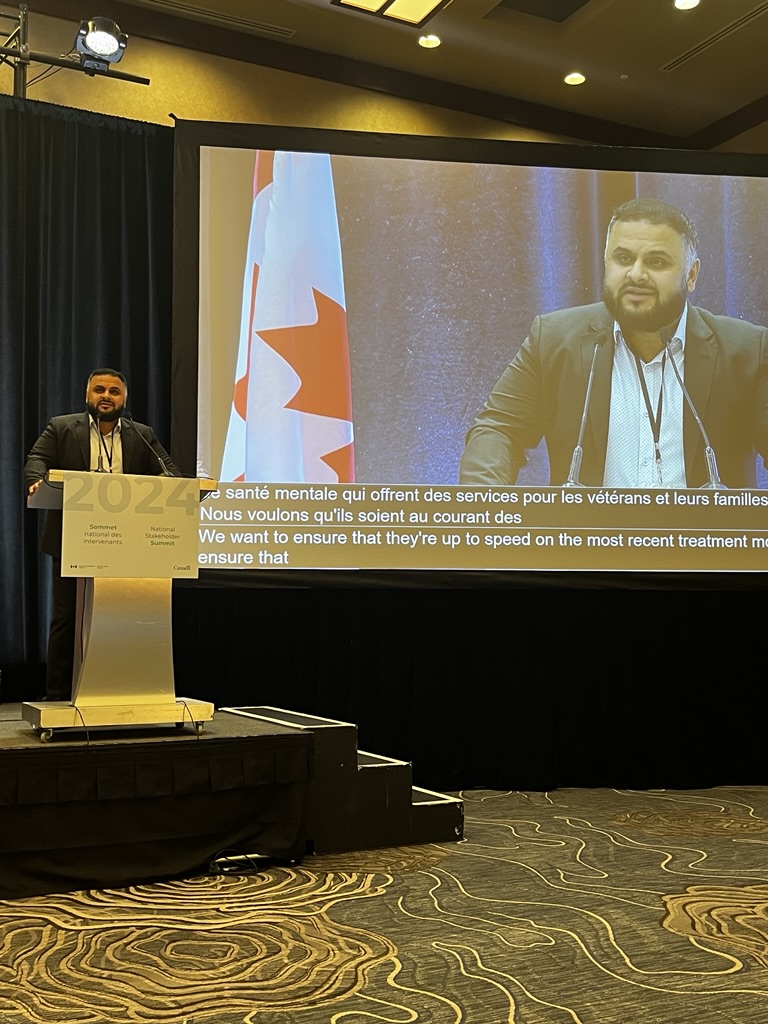
While we are not a lobbying organization, there is no doubt that Atlas can and should play a role in shaping policy priorities as they pertain to Canada’s Veterans and Families, particularly where reform is needed to address gaps in care, representation or access to the services and supports they need.
Through the model of expertise Atlas has developed, we are well-positioned to connect research evidence, lived experience and real-world needs to government decision-making processes. We can do this while ensuring our position is not partisan or tied to political parties but rather to the substantive well-being of those we were created to serve.
We define our work in the policy space as a strategic and deliberate process of translating evidence into action. This approach emphasizes collaboration: working with governments, policy actors, community organizations and lived experience experts to inform, support and co-create better policies, programs and services.
Roundtable on barriers to access for rural and remote Veterans
In October 2024, Atlas hosted a national roundtable in Winnipeg, focused on the issue of unique barriers to mental health care experienced by Veterans and Families living in rural and remote communities.
The multi-layered engagement model brought together Veterans, Family members, service providers, policy makers and researchers in an honest, cross-sectoral discussion about what’s working, what’s broken and what needs to change. Our goal for the day was three-fold: to define the problem, share knowledge and co-develop policy solutions.
The day was structured around panels, breakout discussions and real-time feedback loops. These conversations were synthesized into a report that captures both lived experiences and system-level insights. To strengthen the policy relevance of the work, we partnered with the McMaster Health Forum to develop a rapid evidence profile that draws from academic and grey literature to complement the on-the-ground knowledge.
Presentations to the Standing Committee on Veterans Affairs
May 2023: The House of Commons Standing Committee on Veterans Affairs (ACVA) undertook a comprehensive study on women Veterans. Topics covered included the physical and mental health challenges as well as the treatment of injuries and illnesses most likely to affect women during their military service, the unique aspects of transitioning after service for women, retirement and long-term care, and initiatives developed in allied countries. MaryAnn Notarianni and Dr. Sara Rodrigues, who leads the Athena Project at Atlas, were invited to present expert evidence as part of the committee hearings.
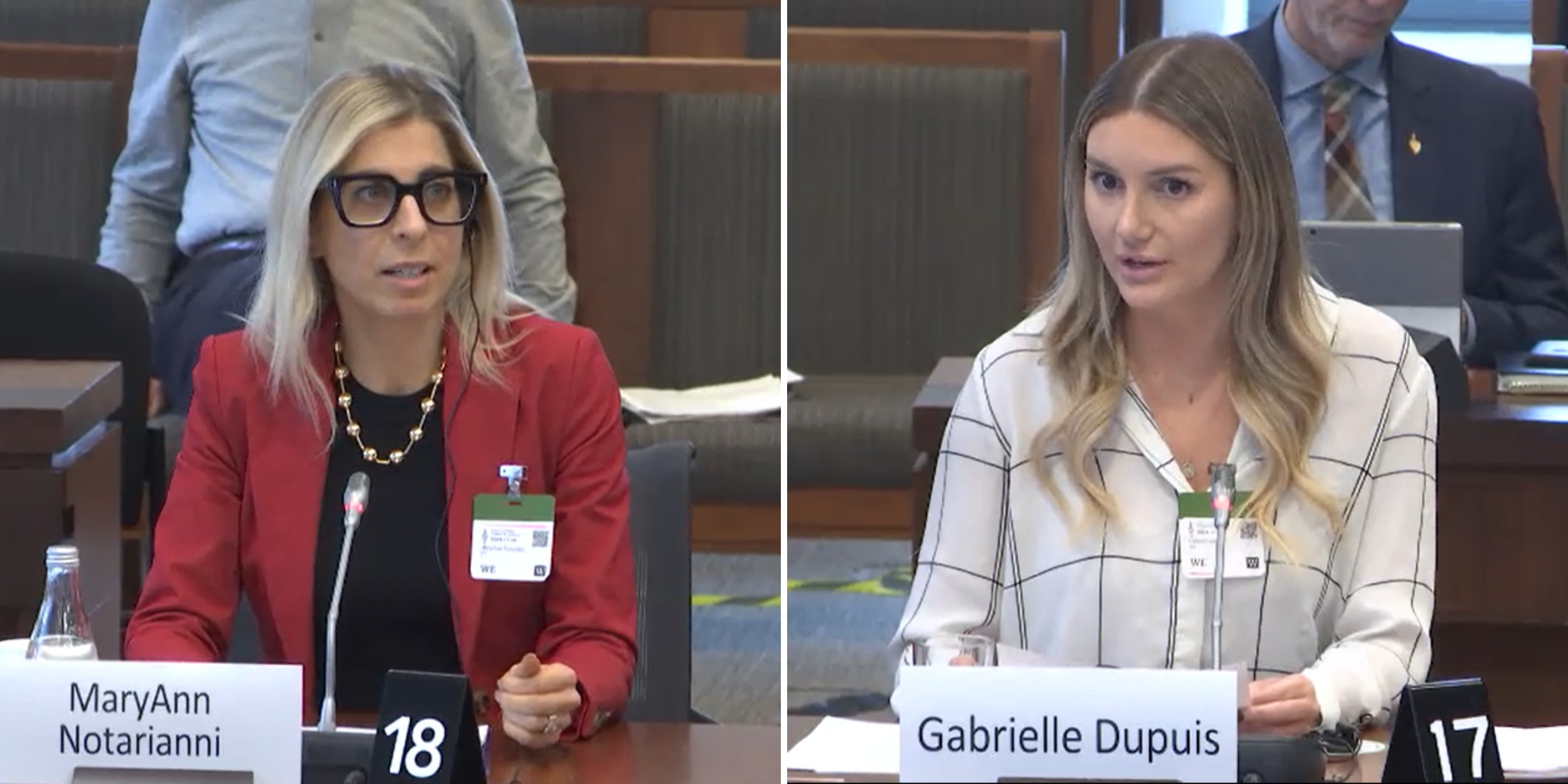
December 2024: The ACVA also held hearings to study the experiences of Indigenous and Black Veterans, specifically examining the challenges they face in accessing benefits, support and recognition after their service. These hearings aimed to address systemic barriers and injustices that marginalize these groups. At the invitation of the Committee Chair, Deputy CEO and Executive Vice-President MaryAnn Notarianni presented in person and Director of Knowledge Mobilization Meriem Benlamri presented virtually on behalf of Atlas.

Reach
Expanding our reach
By the numbers
2020-21: 21,600
2021-22: 91,879 (up 325.4%)
2022-23: 1,527,696 (up 1,562.7%)
2023-24: 1,307,512 (down 14.4%)
2024-25: 1,862,926 (up 42.5%)
April 1, 2021: 542
April 1, 2022: 891 (up 64.4%)
April 1, 2023: 987 (up 10.8%)
April 1, 2024: 1,085 (up 9.9%)
April 1, 2025: 1,020 (down 6%)*
* Twitter/𝕏 deleted millions of inactive/bot accounts in April 2024, resulting in the loss of several inactive followers in 2024-25.
April 9, 2021: 233**
April 1, 2022: 903 (up 287.6%)
April 1, 2023: 1,262 (up 39.8%)
April 1, 2024: 1,586 (up 25.7%)
April 1, 2025: 1,881 (up 18.6%)
**Facebook follower count only available from April 9, 2021 onwards.
April 1, 2021: 256
April 1, 2022: 784 (up 206.3%)
April 1, 2023: 1,083 (up 38.1%)
April 1, 2024: 1,394 (up 28.7%)
April 1, 2025: 1,757 (up 26%)
April 1, 2021: 17
April 1, 2022: 34 (up 100%)
April 1, 2023: 47 (up 38.2%)
April 1, 2024: 99 (up 110.6%)
April 1, 2025: 127 (up 28.3%)
2021: 755 (up 75.6%)
2022: 1,326 (up 76.5%)
2023: 2,341 (up 9.6%)
2024: 2,567 (up 9.7%)
2025: 3,126 (up 21.8%)
